Options at 16
Guidance for pupils commencing the Sixth Form in August 2025



Guidance for pupils commencing the Sixth Form in August 2025


Your Sixth Form years should be the most engaging and fulfilling time of your school life. This is when you form lasting friendships, delve deeper into subjects that genuinely interest you, and begin to chart the course for your future beyond the school environment. Here, within our supportive community, we strive to ensure that you enjoy and flourish in your chosen academic subjects, take advantage of the diverse co-curricular opportunities on offer, and receive guidance as you navigate the university admissions process.
We are dedicated to preparing you for a lifetime of learning, fostering not only academic excellence but also the personal values of curiosity, confidence and kindness that will guide you throughout your life. We nurture your curiosity to encourage independent thinking and a passion for discovery. Through a focus on academic rigour and success–following the Cambridge International AS and A-level syllabi across a wide range of subjects–we build the confidence you need to excel in your endeavours.
But education is more than academic success. Throughout your time with us, you will gain the freedom to develop your individual interests inside and outside the classroom. We encourage you to challenge what you might have accepted as fact, to question your teachers, and to learn for yourself. In essence, we want you to understand that education is something you seek to acquire–not simply something you are given.
We offer a broad range of co-curricular activities designed to cultivate leadership and an understanding of the importance of contributing to both local and global communities. We emphasise kindness in all interactions, fostering a supportive environment where every pupil feels valued and empowered.
Our dedication to internationalism prepares you for university applications worldwide. Our alumni proudly represent us at top universities in the UK, Europe, Asia, Australia and the USA. With small class sizes and a personalised tutoring system, we ensure you receive the support and guidance necessary to fulfil your potential.
As you consider which subjects to pursue, we encourage you to focus on what you enjoy and where your strengths lie, while also thinking about the skills you will need for your future–some of which may be in careers that don’t even exist yet. We are here to help you strike that balance and to support you every step of the way.
We take pride in our friendly and inclusive environment, preparing you for diverse and fulfilling future careers. Our goal is to develop tomorrow’s aspiring leaders who embody curiosity, confidence and kindness in all they do.
Please feel free to contact us out if you would like to discuss any of these decisions further, and wish you good luck on this exciting journey ahead!
Luke Turnill Head of Sixth Form


Pupils benefit from a variety of specialist programmes, including courses in entrepreneurship and critical thinking. Expertise from across the family of schools helps pupils manage the transition from school to university, and to explore career options.
Academic results are consistently excellent across the Brighton family of schools, with the most popular destinations for Brighton Year 13 leavers being prestigious universities in the UK, USA and Canada.
Freedom with support
You are encouraged to be independent, but that does not mean you are on your own. Known by your tutors and supported by the Wellbeing Team, there is always someone looking out for you.
We are experts at preparing you for applying to university, either here or abroad. Recent leavers also visit to share their experiences – social and academic. 1
University preparation

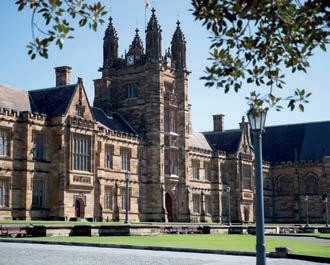
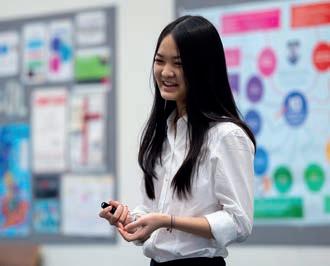

Leadership
Our Sixth Form pupils set the tone for the school, and there is a wide range of leadership opportunities on offer. Why not make your mark by becoming a mentor or a prefect?
Variety of opportunities
Academically, we offer A-levels, and we also offer an array of co-curricular opportunities, including performing arts, music and sports.
We like nothing more than to give you the opportunity to stretch yourself. You will find many essay competitions, Olympiads and extension sessions to keep you sharp.
5
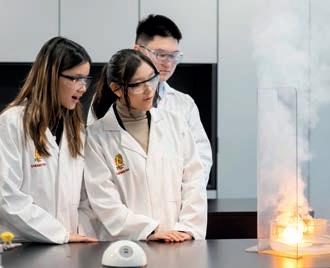
8

The era of fake news means you have to learn to think critically. We combine philosophical, historical and practical perspectives to ensure your own arguments are robust.
Social entrepreneur Business entrepreneur
We encourage you to throw yourself into putting something back into the community, from volunteering abroad to reading to local senior citizens.
6
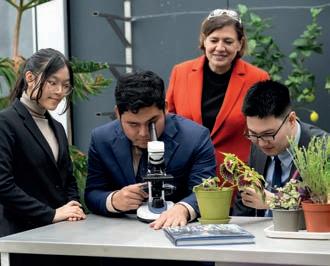
9
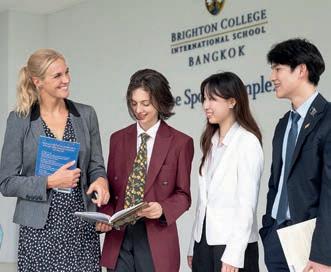
Bangkok is a cosmopolitan city, and our campus reflects this. Our pupils’ experiences represent a cross-section of society, both locally and globally.
7
Our Entrepreneurship Programme is unique, giving every member of our Sixth Form a chance to create a business plan and present it to industry experts.
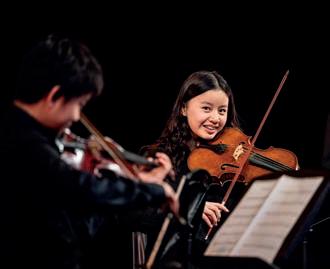
10
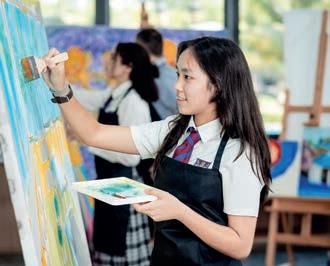
Our commitment to you does not stop after you leave us: you will have the opportunity to join the Old Brightonians network with thousands of members across the world.
Brighton College Bangkok Vibhavadi is housed within a state-of-the-art new building with first-class facilities, and enjoys the advantage of the support of the international Brighton College family of schools.
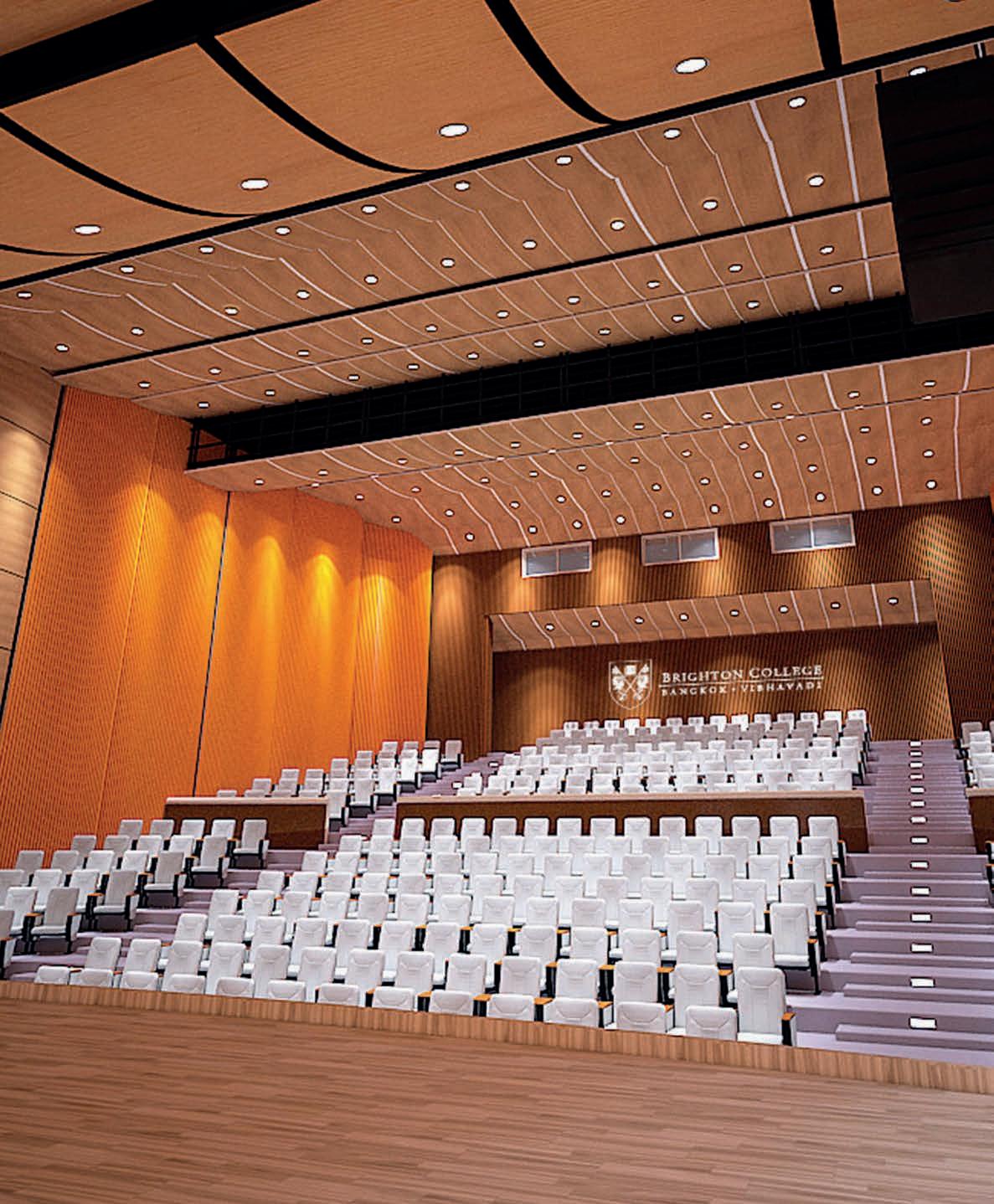
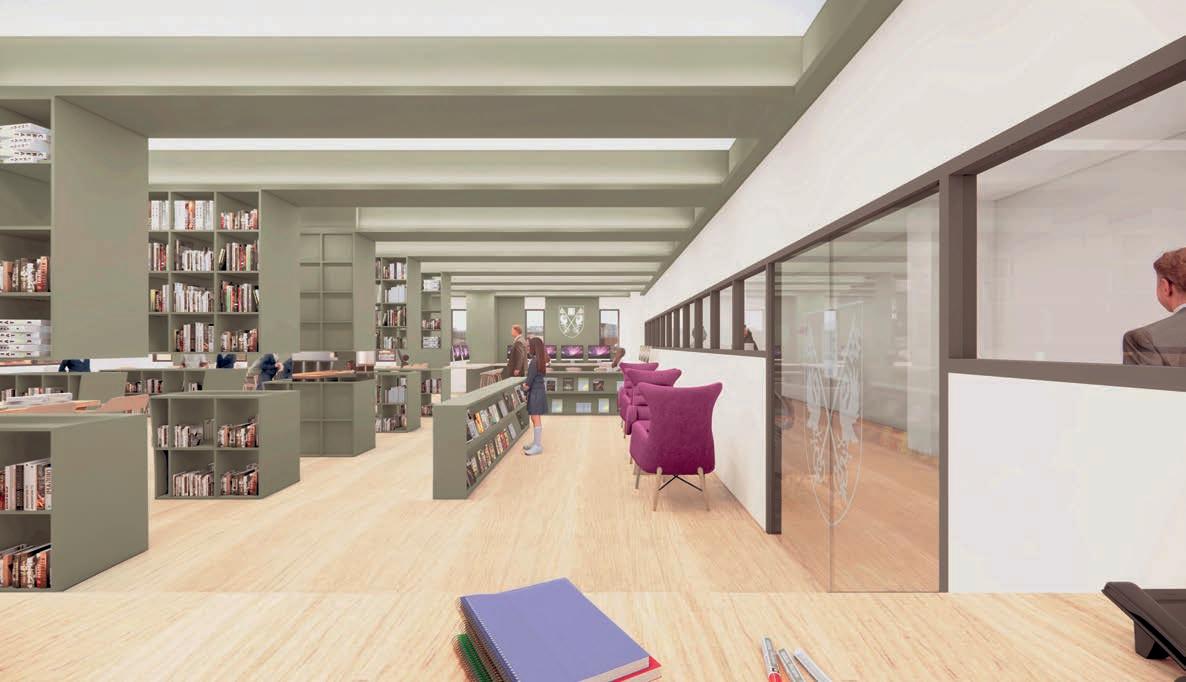
The Sixth Form Centre acts as a Global Futures hub, where pupils are able to access guidance on university applications and careers. Space is provided both for independent study and collaborative group work, whilst ‘The Club’ offers a more relaxed area for pupils to read and socialise with their peers.
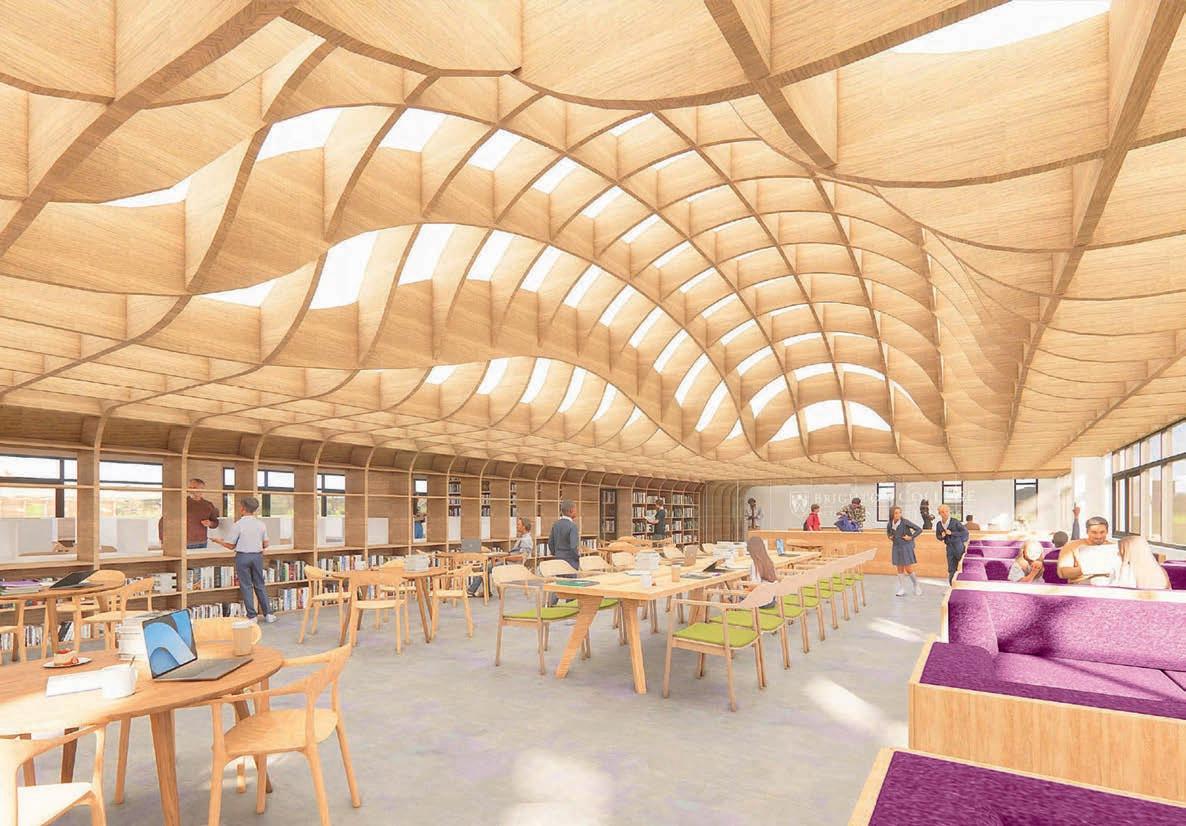
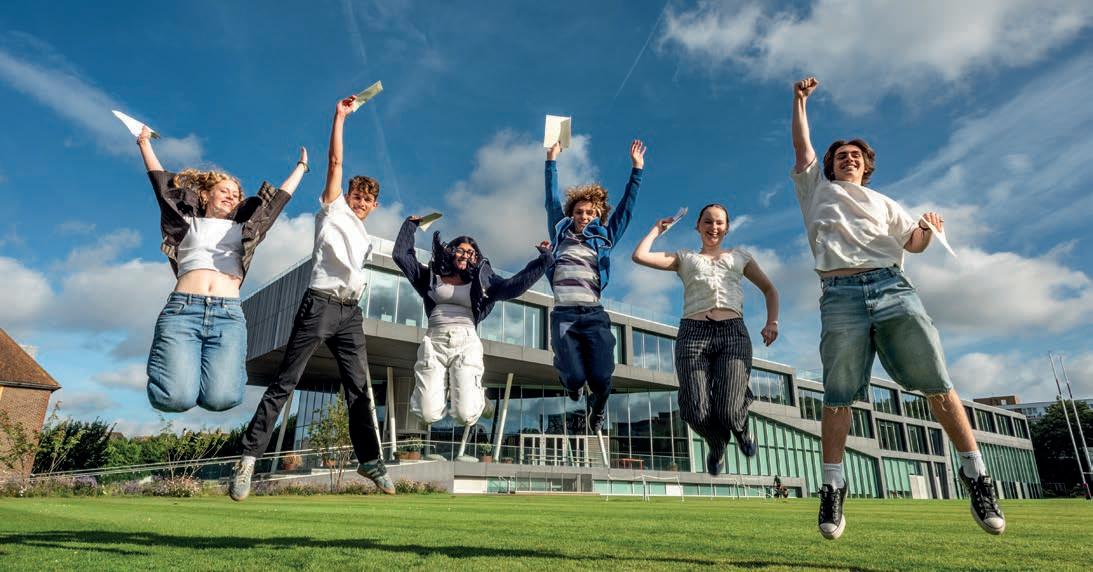
167 A* grades for girls
167 A* grades for boys 87% A*-A
Sixth Form pupils in Brighton College Bangkok Vibhavadi benefit from being part of an award-winning family of schools. Brighton College UK was named ‘Best Sixth Form in Britain (2024)’ and is the top A-level school in the UK.
Source: Ofqual
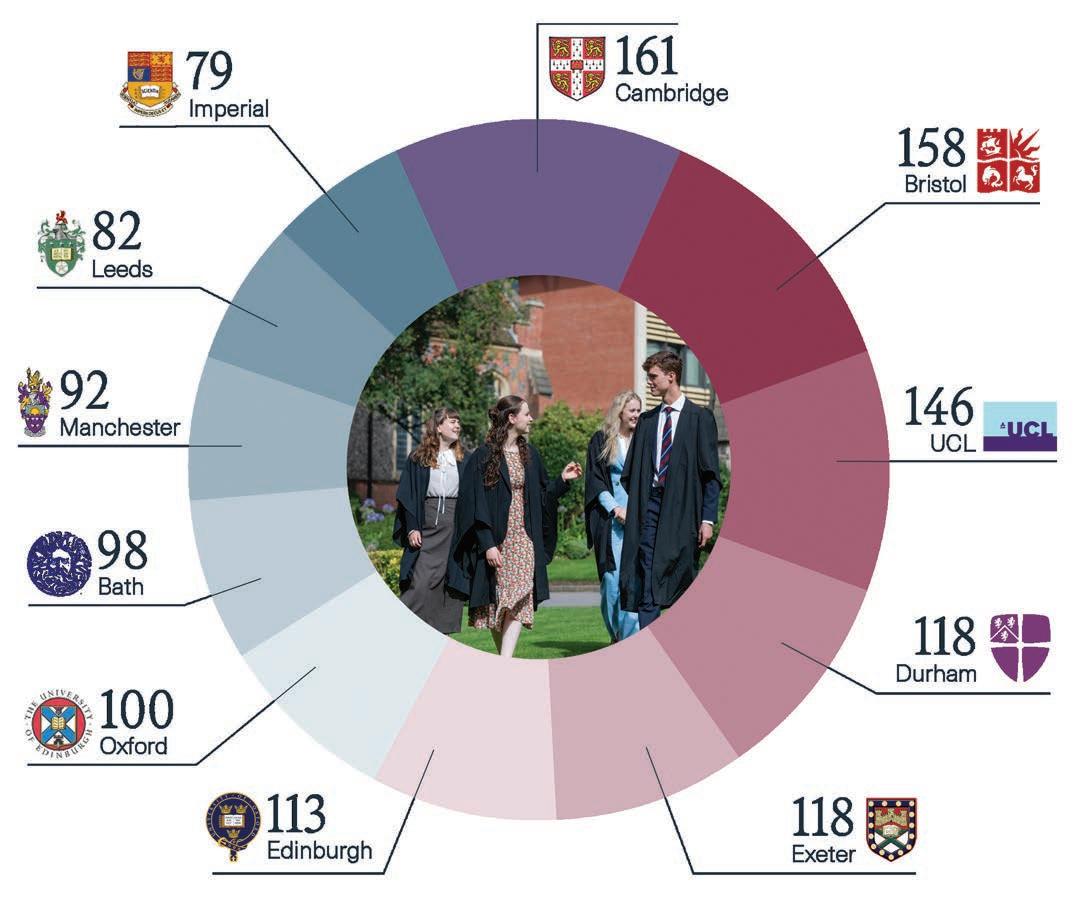
1in 6
pupils receive Oxford or Cambridge offers
35% of pupils embark on STEM courses at university
80% of pupils offered places at Russell Group Universities
UNIVERSITY OF TORONTO

UNIVERSITY OF WISCONSIN-MADISON
UNIVERSITY OF WASHINGTON

PEPPERDIME UNIVERSITY
NEW YORK UNIVERSITY
EMORY UNIVERSITY

UNIVERSITY OF EXETER

DURHAM UNIVERSITY
IMPERIAL COLLEGE LONDON
BOSTON UNIVERSITY
NORTH EASTERN UNIVERSITY

UNIVERSITY OF CAMBRIDGE UNIVERSITY OF EDINBURGH



UNIVERSITY OF HONG KONG

CHULALONGKORN UNIVERSITY
THAMMASAT UNIVERSITY

MAHIDOL UNIVERSITY
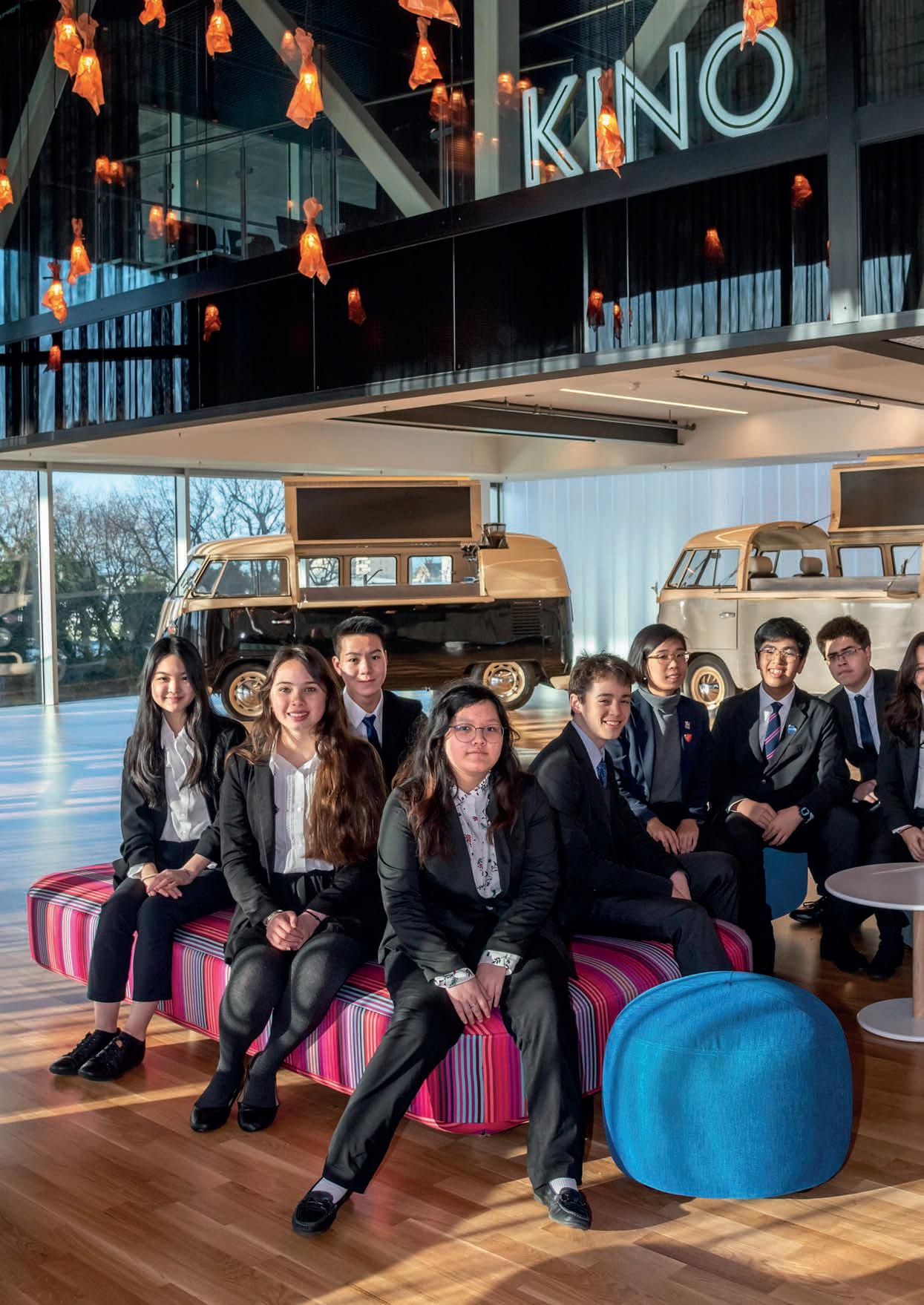
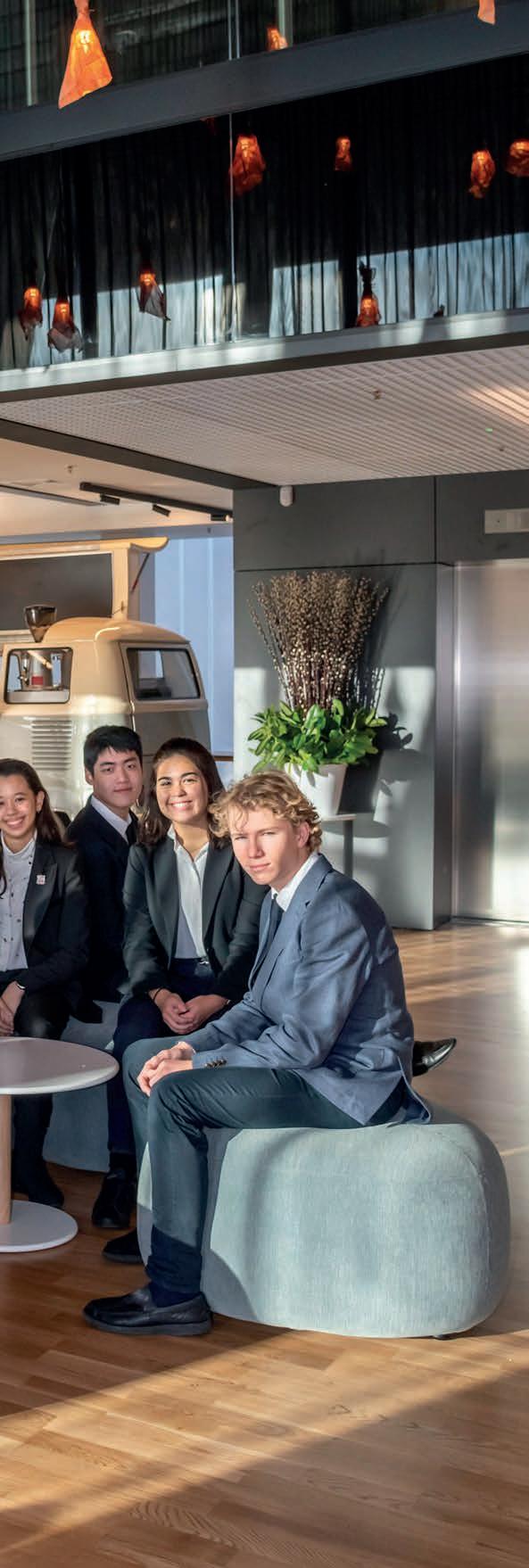
The schools in the Brighton College family are unashamedly academic schools, and many of our pupils aspire to the very best courses at some of the world’s top Higher Education institutions. Brighton College Bangkok Vibhavadi offers a wide range of A-level qualifications, and with an AS level still completed at the end of Year 12, our pupils can demonstrate just how much they do know to universities at application. We also firmly believe that this is best achieved through a rich and varied curriculum, with sport, volunteering, leadership opportunities, critical thinking and entrepreneurship all deeply embedded into it. Pupils will usually start Year 12 pursuing four subjects, with maths and further maths together counting as two. It is our expectation that most pupils will drop one of these subjects either in December or June of Year 12, and continue with three subjects to completion at the end of Year 13. We believe that it is advantageous for pupils to study four subjects for at least a term for a number of reasons:
• It provides flexibility when pupils change their minds over which subjects to pursue in Term 1 of Year 12. This often occurs as pupils’ relative ability in, and enjoyment of, different subjects at A-level is often different to those at IGCSE and to their own perceptions.
• Doing four subjects rather than three for just one term out of a six-term linear course (an overall increase in workload of around 5% across the two years of the A-level courses) should not have an impact on final attainment in those other subjects.
• Doing four subjects, even if only for a term, offers an academically enriching and broadening experience.
If you wish to choose from the range of academic A-levels that we offer, we require you to have a good grounding across the IGCSE subjects that you have studied.
We expect this to be an average grade of at least a B across all subjects, with a minimum of 5 A*-C’s (or equivalent). Passing these thresholds will ensure that you enter the Sixth Form well prepared for the challenges that lie ahead. There are also specific IGCSE grades required to embark on some courses at A-level, and these are highlighted in the subject profiles. We do not ask anyone to leave at the end of Year 11. However , if you are a current pupil, we ask you to achieve an average of a grade B or higher in order to pursue a full A-level programme. Should you fall below this standard, we can look at a reduced programme that may include re-sits and other additional life-skills courses.
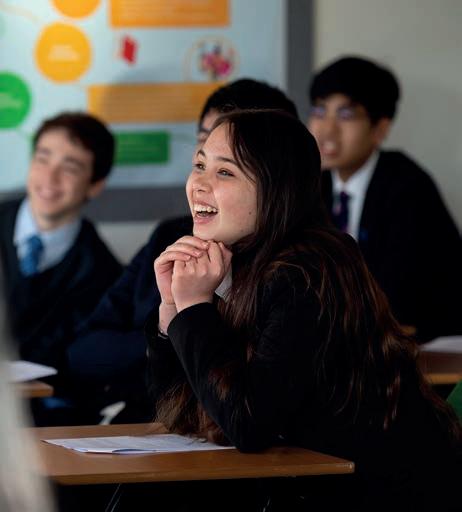
Life beyond lessons at Brighton College Schools is busy! Alongside music, drama, dance, art and sport, there are also a large number of clubs and societies that occur during the day. These activities have been chosen to give pupils a chance to try something different. For example, you may be interested in activities such as Chess Club, Senior Debating Society, Yoga, Thai Cooking and Model United Nations. All academic departments also have active senior societies, from History Society, to Maths Club, Medical Society and Creative Writing. Both sport and community work are important components of our Sixth Form curriculum, meaning that everyone can keep fit and give something back.
Brighton College Bangkok Vibhavadi’s residential field trips programme offers pupils unforgettable experiences that combine learning, adventure and personal growth. From exploring historical landmarks, to engaging in
outdoor activities, each trip is designed to enhance classroom knowledge while promoting independence, teamwork and resilience. Pupils develop practical skills, form lasting friendships, and gain a deeper understanding of the world around them. Supported by dedicated staff and tailored to different year groups, our field trips programme creates lifelong memories and cultivates a spirit of curiosity and discovery, enriching the educational journey for every participant. Examples of destinations in previous years include Chiang Rai, Hua Hin and Rayong. Community service always plays an important part in these trips, whether it is helping to build a new school building in Chiang Rai, or undertaking beach clean-ups in Rayong. In the future we aim to run trips abroad which will broaden our pupils’ understanding of other cultures and broaden their horizons!
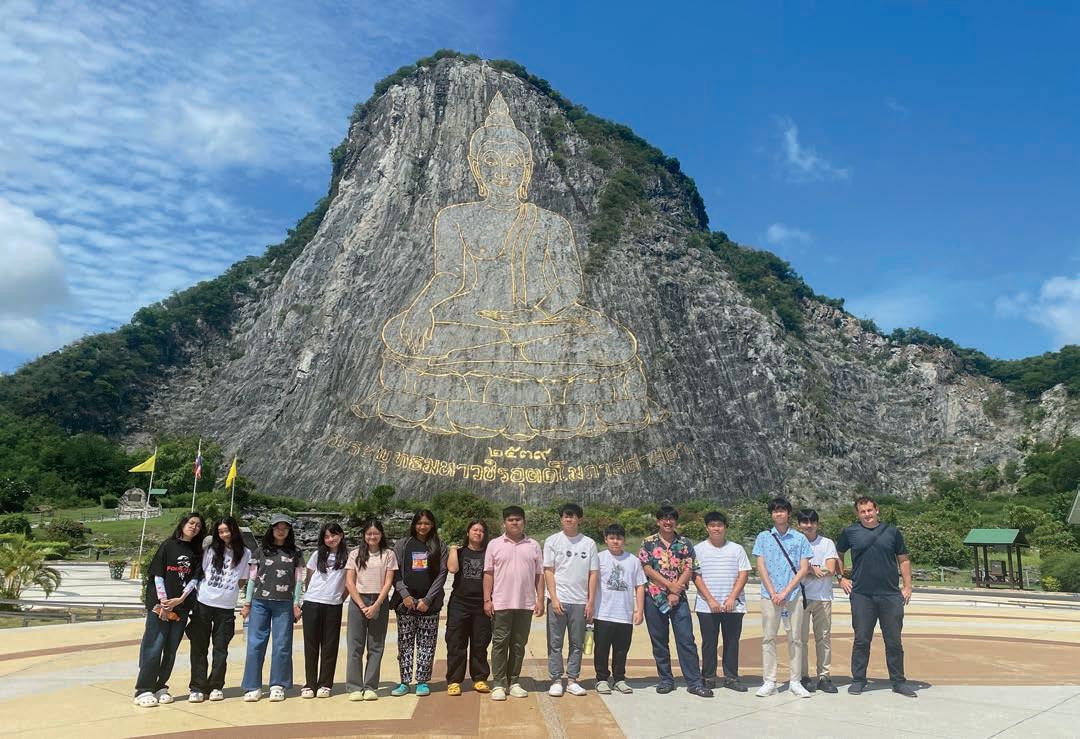

Brighton College Bangkok Vibhavadi’s performing arts programme is a vibrant hub of creativity, expression and talent. Through engaging classes and captivating performances, pupils explore various styles of theatrical techniques. The programme nurtures confidence, teamwork, and artistic expression, offering opportunities to perform in school productions and beyond. Pupils develop technical skills and a love for the performing arts, and our programme inspires pupils to shine. An annual Talent Show is an enjoyable opportunity for pupils to show their dramatic, comedic or dance skills. Senior productions in the past have included “Grease”, “Hairspray” and “Jane Eyre”, all to rapturous applause!

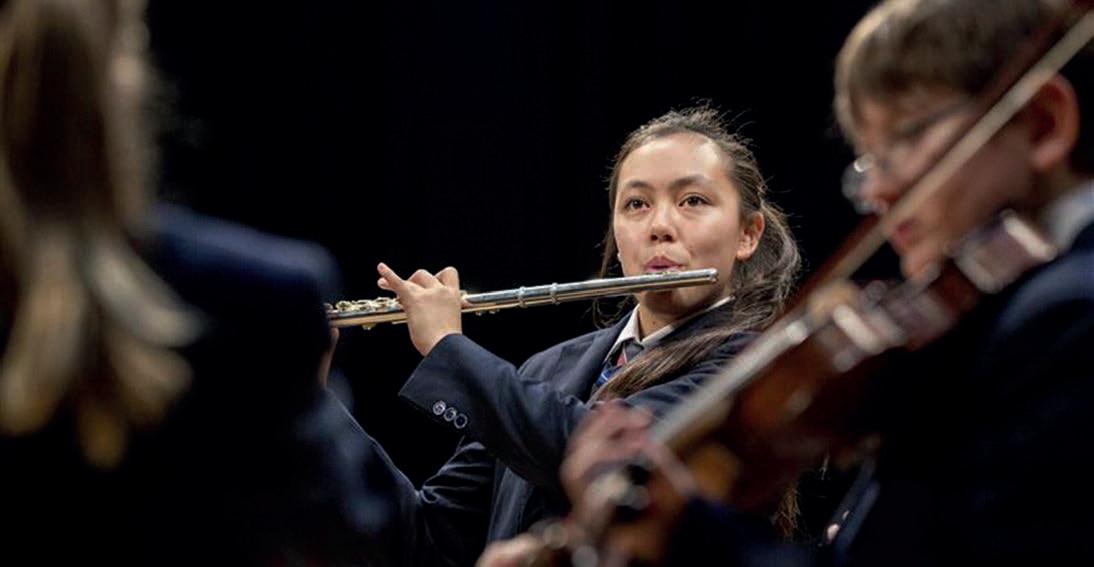
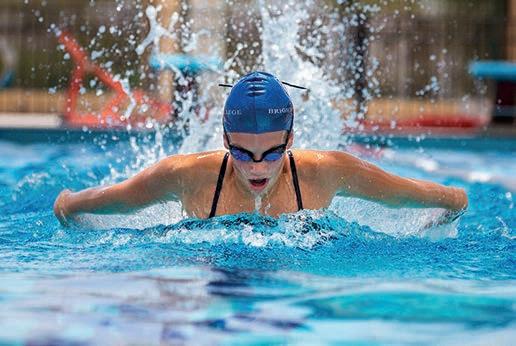
Brighton College Bangkok Vibhavadi encourages musicians of all ages, abilities and aspirations. During lunchtimes and after school, making use of the excellent facilities and practice rooms, pupils are always busy developing their musical skills and enjoying their music-making. As a constant motivation to rehearse, there are many opportunities, both in-house and at external venues, to perform at concerts and competitions. Musical groups for everyone are offered: jazz bands, orchestras, traditional Thai ensembles, fusion bands, chamber groups, and rock bands. Some of the pupils are already excellent musicians who go on to study music at universities throughout the world. Other pupils find that music develops self-discipline, teamwork, meeting deadlines and attention to detail: qualities which transfer to other disciplines after Sixth Form. Meanwhile, most pupils, at all levels, have the opportunity to enjoy being part of a welcoming community where they can enjoy musical collaborations, the fun of performing and creating music for its own sake, and making friends.
Our sports programme is a key component of the holistic education we provide at Brighton College Bangkok Vibhavadi. It is designed to promote physical fitness, teamwork, leadership and a spirit of healthy competition, while fostering a lifelong love of physical activity.
We offer a diverse range of sports tailored to meet the needs and interests of our culturally diverse pupil body, from traditional team sports like basketball, football, and volleyball, to individual pursuits such as badminton, table tennis, swimming and athletics. Our programme caters to all skill levels, ensuring that every pupil, whether a beginner or an aspiring athlete, has opportunities to participate and grow.
Our experienced coaching staff emphasise skill development, sportsmanship, and the importance of balancing academics and athletics. Through regular training, inter-house tournaments, and participation in regional and international competitions, pupils are challenged to set goals, overcome obstacles, and celebrate achievements together.
Additionally, our state-of-the-art sports facilities provide a safe and inspiring environment for practice and play. These include a fully equipped gymnasium, outdoor sports fields, a swimming pool, and specialised courts for various sports.
The sports programme at Brighton College Bangkok Vibhavadi is not just about competition—it is about cultivating values of respect, discipline and collaboration that resonate far beyond the field of play. Join us in building champions both on and off the field.
The community service programme at Brighton College Bangkok Vibhavadi is at the heart of developing compassionate and socially responsible pupils. Every year group has a community service partner, and through these partnerships pupils actively contribute to meaningful projects, from environmental clean-ups to providing speaking books for the blind, to visiting and supporting an AIDS hospice. These hands-on experiences nurture empathy, leadership and a deep understanding of social issues. By blending classroom learning with real-world action and fundraising activities, our programme empowers pupils to make a lasting impact while developing skills for future success.
Brighton College Bangkok Vibhavadi’s Duke of Edinburgh International Award (the Award) programmeme is a celebrated, and world-wide initiative that empowers pupils to develop essential life skills, resilience, teamwork and independence. Through its four components: (Voluntary Service, Physical Recreation, Skills and Adventurous Journey), participants are encouraged to step out of their comfort zones and embrace personal challenges. They gain confidence, teamwork skills, and a sense of achievement, and form deeper bonds with their peers. The Award has three levels, (Bronze, Silver and Gold), and at each level the challenge and time commitments increase. The Award is also globally recognised and respected, and can enhance applications to prestigious universities worldwide.
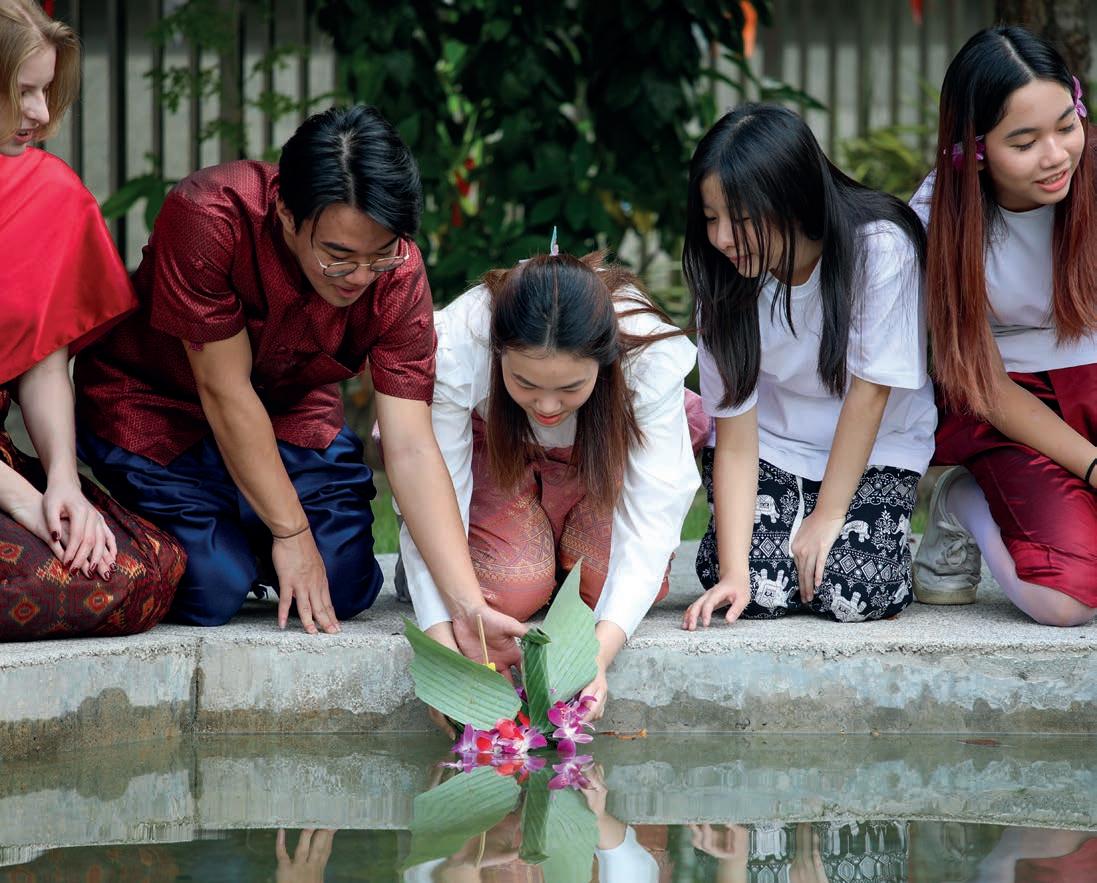
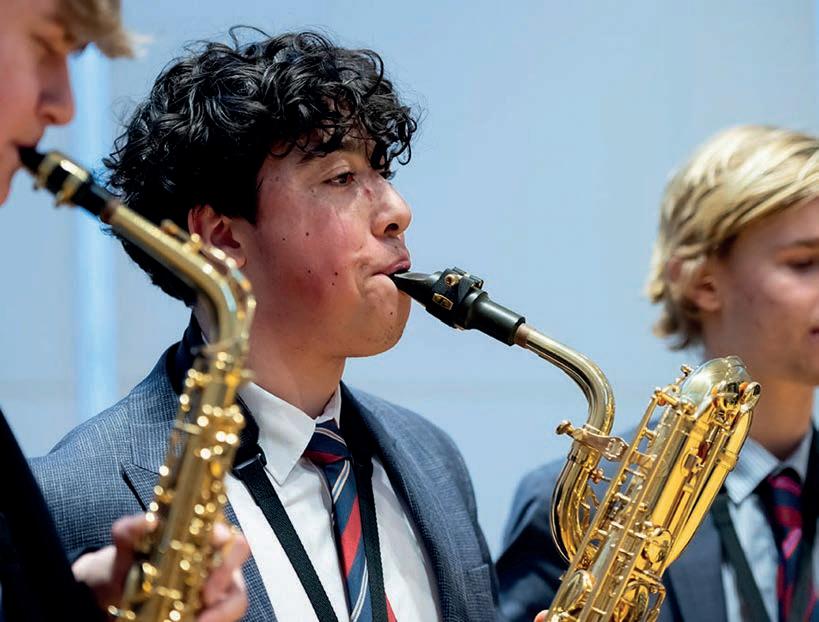

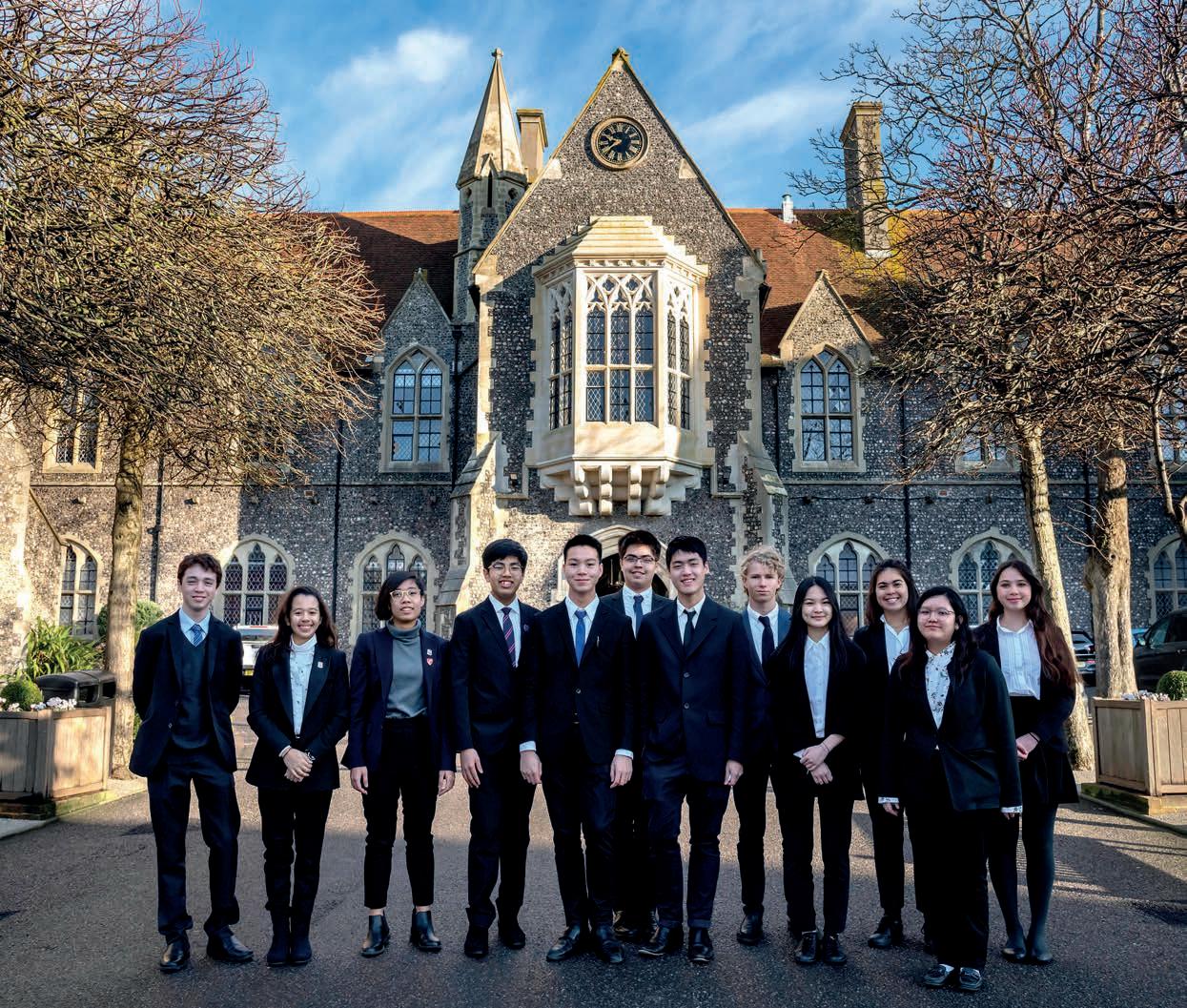
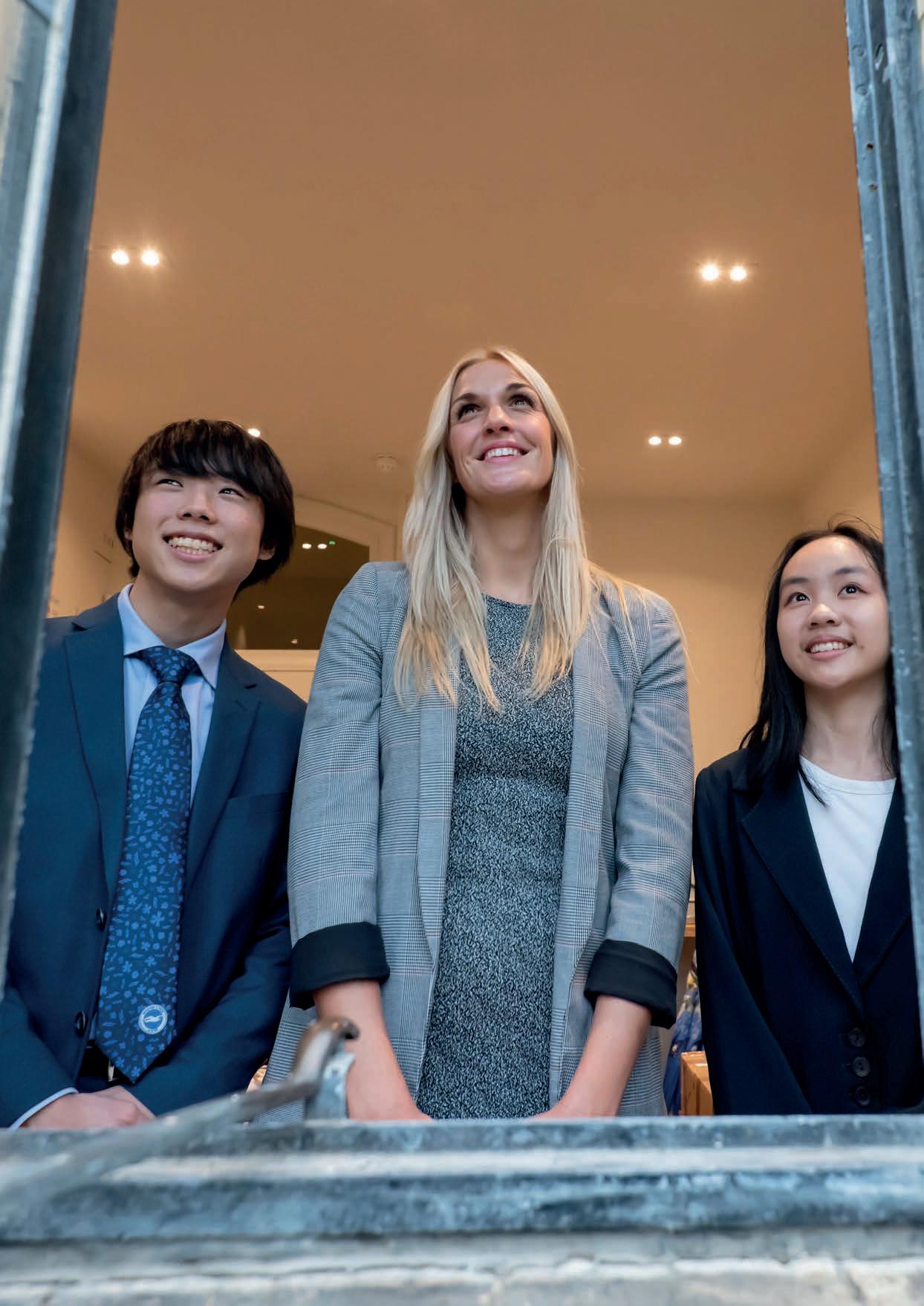
Brighton College pupils in Bangkok have benefited from close links with Brighton College UK campus through trips, shared competitions, and shared practice and educational innovation shared across our family of schools. Trips to Brighton are popular, and pupils enjoy getting to know their peers at Brighton College UK, the United Kingdom’s School of the Decade.
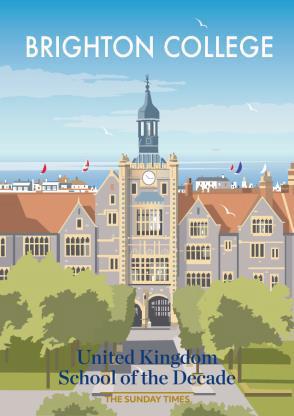

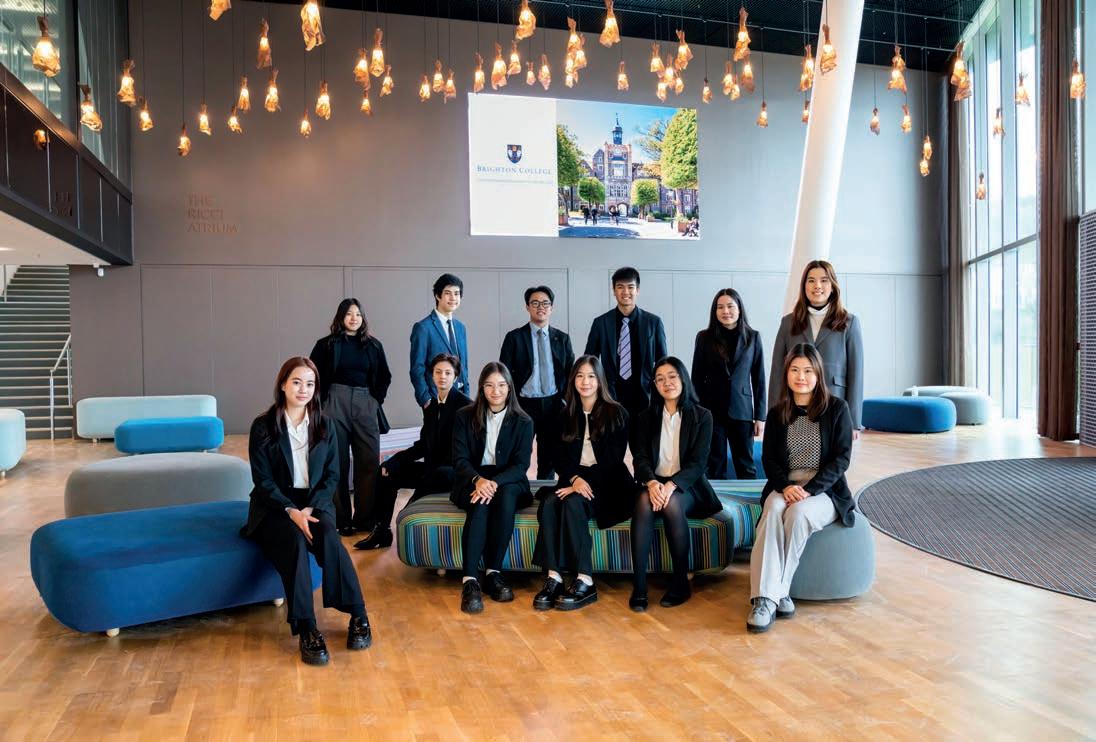
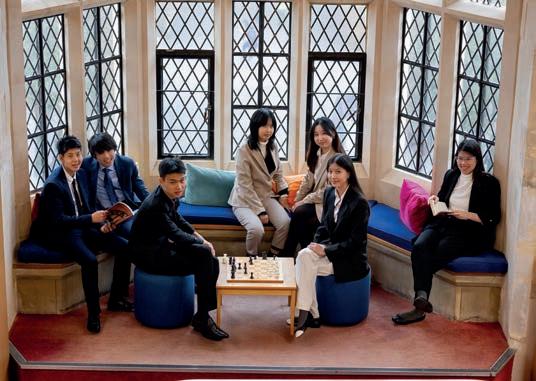
Brighton College
International schools have a long tradition of visiting Brighton College in the United Kingdom. These trips help to broaden horizons by exposing pupils to universities in the UK, and allow our wonderful Global Futures team to advise pupils on topics such as:
• The Global University Landscape
• Critical Thinking and Presentation Skills
• Guidance on conducting research
All Year 12 pupils have critical thinking embedded into their broader education at a variety of levels. This develops skills which will help with A-level exams, university entrance tests and at undergraduate level in the future.
Pupils reflect on topics relating to the development of national and international identity, with a particular focus on colonialism and social justice movements. They do so with an explicit focus on academic skills such as the analysis of argument, presentation skills, reading skills, problem solving and detecting bias in sources.
Brighton College Bangkok Vibhavadi’s Model United Nations (MUN) programme is a dynamic platform where pupils develop global awareness, critical thinking and diplomacy skills. Through engaging simulations of UN debates, participants represent countries, research pressing international issues, and negotiate solutions in a collaborative environment. Guided by experienced mentors, our MUN teams have achieved notable success at regional and international conferences, earning accolades for their leadership and well-reasoned arguments. Beyond awards, the programme encourages confidence, public speaking, and teamwork, empowering pupils to become informed global citizens and future leaders in addressing real-world challenges.
The community engagement programme at Brighton College Bangkok Vibhavadi’s is at the heart of developing compassionate and socially responsible pupils. Through partnerships with local organizations, charities, and global initiatives, pupils actively contribute to meaningful projects, from food drives and environmental clean-ups to mentoring programmes and hospice care.
These hands-on experiences nurture empathy, leadership, and a deep understanding of social issues. By blending classroom learning with real-world action, our programme empowers pupils to make a lasting impact while developing skills for future success.
“Brighton College offers a staggering range of opportunities.”
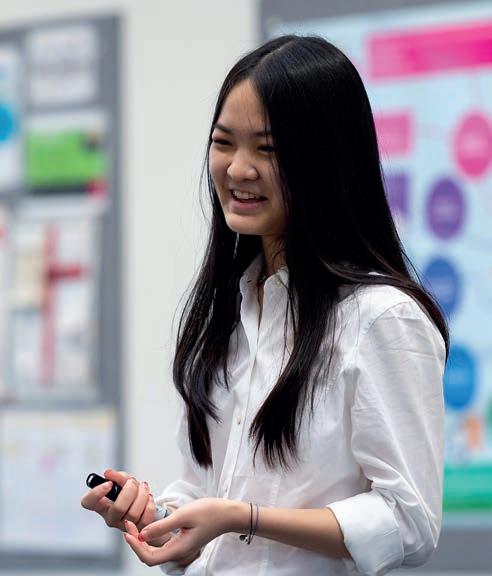
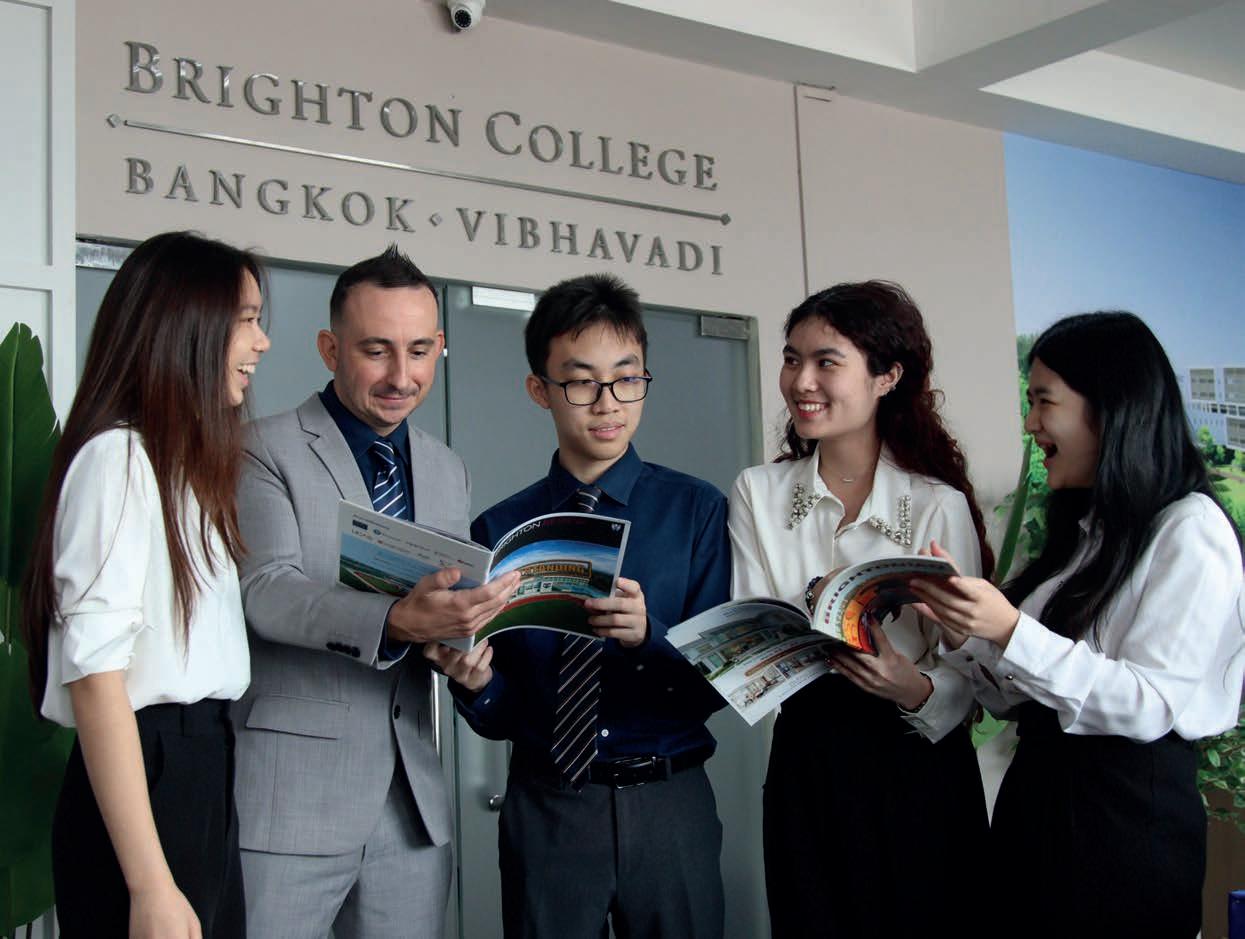
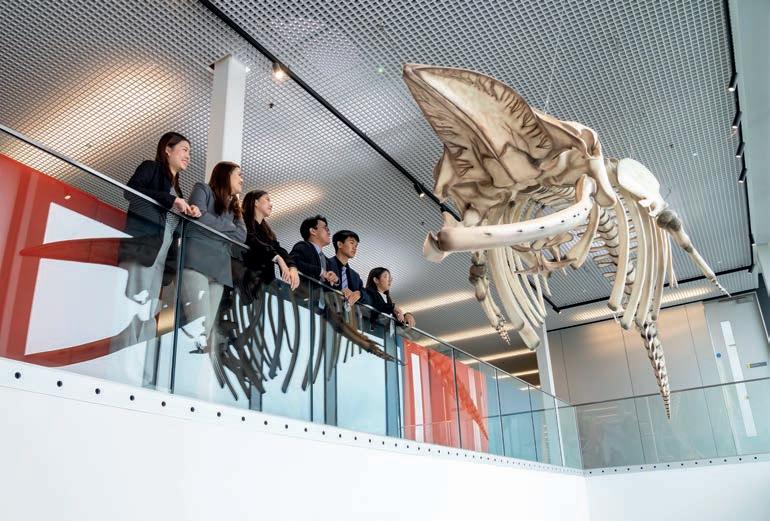
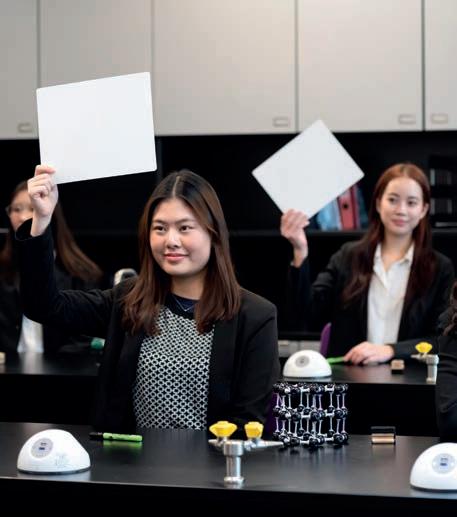
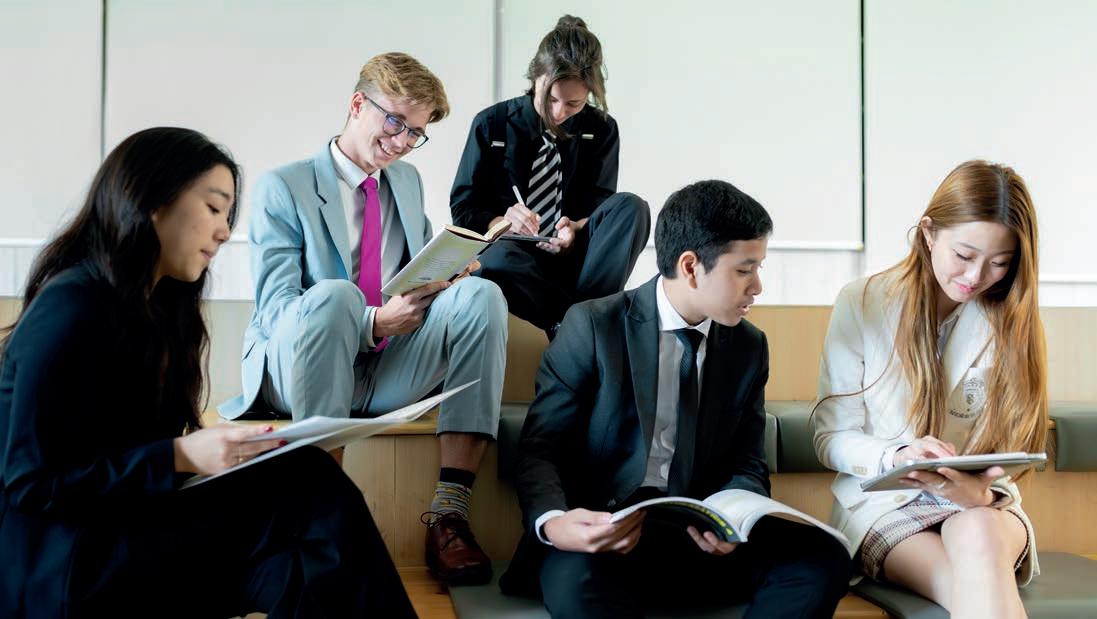
Deciding on which four (and later three) subjects to study is notoriously tricky, particularly for those pupils whose interests are broad. However, there are three relatively simple questions which should be asked in order to frame discussions on which subjects to choose:
1. Which subjects are you good at?
2. Which subjects do you enjoy?
3. Which, if any, subjects are required in order to facilitate access to desired higher education options?
All three considerations matter; but the least emphasis should be placed on the third. Aspiring towards a particular degree course which may not align with the interests or abilities of the pupil can result in inappropriate subject choices being made. Ultimately, this will lead to fewer higher education options, as the single most important factor in most university applications is the grades achieved, rather than which subjects they are in. Our advice is, therefore that pupils should not choose a subject because they think they need it;it is better to select a subject because it is of interest, and because pupils think they would be good at it.
The following pages outline the range of different Sixth Form subjects on offer at Brighton College Bangkok Vibhavadi. Although we seek to offer the full range of subjects outlined in this booklet, pupils and parents should be aware that we may not be able to run subjects if insufficient numbers of pupils select them.
Talking to your teacher about your particular abilities and interests is strongly advised, not least because many subjects have a significant jump in the level of sophistication and challenge at A-level, and teachers will be able to give honest and constructive advice as to how pupils might navigate that jump. In addition, the style of study in some subjects can change significantly between IGCSE and A-level. Although the rigour of IGCSE courses aids this transition, in many subjects there remains a considerable rise in conceptual difficulty to A-level. It can be the case, therefore, that pupils find an A-level very challenging (and, hence, not very enjoyable) in a subject that they enjoyed and found relatively accessible at IGCSE. Since universities will make conditional offers based, usually, on three A-level grades, it is very important to bear this in mind when choosing A-level subjects.
With this in mind, we have, over many years, looked carefully at the IGCSE qualifications that pupils require, if they are to find particular A-level courses accessible. Where relevant, these requirements are highlighted in the subject pages that follow.
In Term 1, all existing Year 11 pupils will be interviewed along with their parents, to discuss their goals and university aspirations, and to give an initial indication of the subjects they would like to study in the Sixth Form. An options event takes place in January, after mock examinations, at which pupils are asked to choose four subjects, in order of preference, and a reserve option, which will only be allocated in the case of a timetabling restriction (this happens very infrequently). There will also be a Year 11 Parents Meeting before the choices deadline, so pupils have an opportunity to discuss their options with subject teachers.
Once the choices have been made, option blocks will be constructed which best meet the needs of all pupils. They will then be interviewed about their choices again, and the options will be confirmed by the start of June.
After publication of IGCSE results in August, there will be time for changes to be made to option choices in light of their results. However changes at this time will be restricted by the option blocks that have already been set. We also allow pupils a two-week trial period in which they can change their minds about a subject once their AS course has begun.
Many of the principles related to subject selection and university entrance can be found in a document published by the Russell Group, or Go8 accessible here: https://www. informedchoices.ac.uk/ and here: https://go8.edu.au/study/ information.
It is worth pointing out, however, that successful applications to leading universities, Oxbridge included, very rarely hinge on subject selection. Primarily, they depend upon an extensive and developed interest in the course for which the pupil has applied. This can only be honed through wider reading and genuine engagement with the subject, above and beyond IGCSE and A-level course specifications. Further advice will be provided about this in Year 12, but pupils will ultimately need to demonstrate an academic interest for its own sake. Successful applicants to the most competitive courses at Oxford, Cambridge, Imperial, Chulalongkorn University, UNSW Sydney and others are always independent in their approach to study, and appreciate that their academic interests must be deeper and more holistic than IGCSE and A-level courses permit.

It is also worth being aware that ‘obvious’ subjects are often not required: for example, a theology applicant does not need to study religious studies; an applicant for HSPS or PPE does not need to study politics. A-level maths is more important for an undergraduate economics applicant than A-level economics. However, applicants who have not chosen these subjects in a school where they are available will probably need to remember that they will need to be particularly well prepared to convince an Admissions Tutor of their interest in the course for which they are applying. For those considering an application to the US, it is worth looking at a range of subjects which would allow them to demonstrate breadth, in addition to co-curricular interests.
All Brighton College pupils tend to make an application to a higher education institution during their Sixth Form years or, in some cases, immediately after they have completed their studies (during a gap year).
Generally speaking, if you pick subjects you will enjoy, you are keeping your options open for university. However, for certain courses, particular A-levels are specified; others may be preferred. As a general rule, you should take an an A-level in any school subject you intend to study at university. Beyond this, some required or preferred subject combinations at A-level are listed opposite for possible degree subjects.
“Key to the College’s success is inspirational teaching.”
The Sunday Times

University subject Typical A-level requirements
Accountancy Maths is recommended or required by some universities. There can also be IGCSE Maths grade requirements.
Ancient History History recommended.
Architecture Art or DT often strongly recommended, as a portfolio of work usually has to be submitted. Maths and/or Physics can be beneficial, although most departments only require these subjects to IGCSE.
Art Art, followed by a foundation art course, is normally expected.
Biochemistry Chemistry is usually required, with Biology and/or Maths recommended.
Biological Sciences
Biology is usually required. Some top departments also require or recommend one of Physics, Chemistry or Maths.
Business Business recommended.
Chemical Engineering A-level Maths, Physics and Chemistry are recommended. Further Maths is helpful on the most competitive courses.
Chemistry
Chemistry A-level. Maths essential for some. Physics desirable.
Chinese Studies No subjects required, though Mandarin and / or History may be beneficial.
Classical Civilization History is recommended.
Computer Science Maths A-Level is frequently required and Computer Science A-Level highly recommended.
Dentistry Biology and Chemistry are usually required. Manual dexterity is important.
Drama Drama is recommended.
Economics Maths is required at most universities. Further Maths is preferable for Cambridge and LSE. Economics is strongly recommended.
Engineering Maths and Physics. Further Maths is recommended, especially for Oxbridge and Imperial. DT can be useful.
English English Literature A-level is usually recommended, (at least). History and languages (ancient or modern) can be good supporting subjects.
Geography Geography A-level is usually required or recommended.
History A-level History is specified by several and recommended for others.
History of Art
Human Sciences
History, Art, English or a language recommended for Oxbridge, although they are not required for admission.
Biology is often required. Maths, sciences or geography can be useful.
Land Economy No subjects normally specified, but geography, Economics and Maths are helpful.
Law No subject requirements, although at least one subject which involves use of language and/or essay writing is advised.
University subject Typical A-level requirements
Liberal Arts No specific requirements, although a bias towards arts subjects (e.g. English, Music, History) is usually expected.
Mathematics Maths is required, with Further Maths highly desirable and Physics recommended.
Medicine Chemistry is required and Biology is advised at most medical schools.
Music Music A-level is strongly recommended or required.
Natural Sciences (Biological) Biology and Chemistry essential and Maths or Physics helpful.
Natural Sciences (Physical) Chemistry, Maths and Physics are advised. Further Maths recommended.
Oriental Studies A modern language is required, and evidence of commitment to this course.
Philosophy No subjects specified, but a subject which demonstrates logical thought is highly recommended.
Physics Physics and Maths essential. Further Maths very helpful, especially for the more competitive courses.
Politics English A-Level is recommended.
Psychology Often no specific requirements. The most competitive, and scientific, courses will require two of the following subjects: Psychology, Biology, Chemistry, Physics or Maths.
Theology No subjects specified.
Veterinary Science Chemistry and usually Biology are required. Some courses have a preference for either Maths or Physics as a third A-level.
The A-level ‘Art and Design: Fine Art’ course builds on the skills and understanding acquired at IGCSE. The course encourages imagination, observation and analysis of the visual world. There is an opportunity to learn practical skills such as oil painting, mixed media, photography (both digital and darkroom based) and printmaking, as well as drawing from life. Drawing is a fundamental element of the course, and pupils learn to use this as a basic tool for research and experimentation. Museum and gallery visits lead to the practical exploration of art history and contemporary artists through copies and sketchbook analysis. As the course develops, pupils are encouraged to develop a personal style which becomes the foundation for more advanced work later on. Pupils in the second year explore their ideas in depth and explore the expressive possibilities of materials.
In Year 12, AS-level Art and Design sets a stable foundation for A-level Art and Design. Pupils will have the freedom to experiment in their own A-level Art Studio with a range of techniques and processes. They will gain an awareness and appreciation of the interdependence of Art and Design, and the individuals within cultural and historical contexts, which will feed into the development of key skills for further Art education.
In Year 13, A-level Art and Design requires a substantial amount of dedication and work. Pupils are expected to produce first-hand studies from primary sources to inform the development of their own ideas. The artwork must be selective and show research, recording, development and critical evaluation undertaken during the course. It should include evidence of the development of ideas into personal solutions; experiments with media and processes including trial samples; and examples of how the candidate’s work is influenced by historical, contemporary and cultural factors. Pupils also complete a critical and visual appraisal of theoretical study undertaken in a written essay. For all projects, pupils will have the ability to access workshops, visit galleries and meet artists to further develop their artistic knowledge.
AS-level
Coursework portfolio (10 A2 boards)
Exam portfolio (6 A2 boards)
A-level
Personal Investigation 16 A2 boards 1,500 word essay.
Course
Unit 2: Controlled Assignment (40%): From a series of titles given by the exam board, the candidate chooses one question which needs to be researched by direct observation and documentary research. The project will be planned through a series of prep sheets in which a variety of media is used in the development of ideas as well as for the piece of work to be produced during the examination.
Pupils will develop sufficient skills for the study of art to be rewarding in its own right, but the course also provides an essential foundation for a wide range of careers in art, design and architecture. Art is accepted for entry to arts and humanities courses at universities, and as a supporting A-level in many other subject areas.
Course Requirements
At least a B in IGCSE Art along with enthusiasm and a keen interest in visual art.
After 3.7 billion years of evolution, more than 7 billion Homo Sapiens currently share the planet with an estimated 8.7 million other species of organism: never has an understanding of biology been more important. A-level Biology is concerned with all aspects of life, from the interaction of organelles that drive cellular processes, to the pivotal influence of plants and animals on the global carbon and nitrogen cycles; from understanding the complexities of human health and physiology, to just why conservation of biodiversity is vital to both the survival of the human race and the planet. We endeavour to instil an appreciation of the diversity and complexity of biology that will inspire pupils beyond the syllabus and encourage them to be independent and curious biologists with an awareness of the challenges and innovations in the subject in the 21st century.
The department aims to deliver a balanced course with a strong practical emphasis to underpin theoretical understanding, and to equip pupils with the skills and knowledge necessary to achieve outstanding examination results.
In Year 12, pupils will study: cell structure; biological molecules; enzymes; cell membranes and transport; the mitotic cell cycle; nucleic acids and protein synthesis; transport in plants; transport in mammals; gas exchange and smoking; infectious disease and immunity.
Pupils are also taught the following practical skills:
1. To plan experiments and investigations.
2. To collect, record and present observations, measurements and estimates.
Course Requirements
At least a B in IGCSE Biology, and a B in IGCSE Mathematics.
3. To analyse and interpret data to reach conclusions.
4. To evaluate methods and quality of data and suggest possible improvements.
In Year 13, the Cambridge International A-level Biology course provides a suitable foundation for the study of Biology or related courses in higher education. It is suitable for candidates intending to pursue careers or further study in Biological Sciences, and is a requirement for a number of University courses throughout the world. Pupils study topics 1-11 of the AS course and complete the A-level by studying the following topics: energy and respiration; photosynthesis; homeostasis; control and co-ordination; inherited change; selection and evolution; biodiversity; classification and conservation; genetic technology.
In Year 12 AS-level Biology pupils are assessed by three papers.
Paper 1: A 40 question multiple choice paper lasting 1 hour. Paper 2: A 60 mark structured question paper requiring written responses lasting 1 hour 15 minutes.
Paper 3: A 40 mark advanced practical paper which lasts for 2 hours and takes place in the school laboratory.
Year 13 A-level Biology pupils are assessed by two papers: Paper 4: A 100 mark structured question paper lasting 2 hours.
Paper 5: A 30 mark Planning, Analysis and Evaluation paper lasting 1 hour 15 minutes.
Biology is a topical A-level which can lead to degree courses in new and expanding fields such as genetics, pharmaceuticals, biotechnology, conservation, and applied biological research. It is also essential for applications to medicine, veterinary sciences or dentistry.
Most readerswill not really know what the subject of business studies is all about. Many new pupils think that it is all about money and hope that taking the subject will help them make money in the future! Undoubtedly, business at A-level and beyond is a useful stepping stone on the road to careers in finance, accountancy, banking or business generally, but the subject itself has a lot more to it than just ‘money’!
At the heart of business is the concept of scarcity. Societies have to decide how to distribute resources, given that there is not enough for everyone to have everything they want. Should resources be allocated by the market (the infamous ‘law of supply and demand’) or should the state take charge in the name of ‘distributive justice’? Most economies are based on a mix of these two methods.
At AS-level, pupils study five units:
− Business and the Environment
− People in Organisations
− Marketing
− Operations and Project Management
− Accounting and Finance
In addition to the knowledge and understanding acquired at AS-level, pupils are introduced to a number of new concepts. The A-level extended syllabus covers, project management, organisational structures, sales forecasting and strategic models.
At A-level, pupils study six units: Business and the Environment; People in organisations Marketing; Operations and Project Management; Accounting and Finance; Strategic Management
Assessment
AS-level
Paper 1 - 1 hour 15 minutes Short answer questions Essay Question Choice 1 from 3.
Paper 2 - 1 hour 45 minutes 2 x Data Response Questions.
50% of A-level
A-level
Paper 3 - 3 hours Case Study
Part A - Answer all questions
Part B - Choice of 1 question from 2 options
A-level Business Studies is a valued subject, both by universities and employers, due to the fact that, like history and politics, it requires analysis and evaluation. One of the greatest attractions of the subject is that it gives candidates an understanding of current affairs. A further attraction is the long-term employment prospects this subject can offer, with people with A-level business working in almost every sector.
Course Requirements
At least a C in IGCSE Business or Economics, and/or a B in IGCSE Mathematics and English is highly desirable.
Chemistry is the study of the elements: the 92 naturally occurring types of atom that account for all the matter in our universe. From knowing the atomic structure of these elements, chemists can describe how they react and predict the structure and properties of the molecules and compounds they form. Chemists exploit the properties of substances for the benefit of humankind. Indeed, chemists synthesise new compounds and molecules that exhibit the exact behaviour required for a specific function. From medicines to cosmetics from touch-screen phones to the clothes we wear to the food we eat to the houses we live in, to the fuels we burn, chemists make the lot! By analysing the molecules in distant stars and planets, chemists lead the search for extra-terrestrial life. By developing new drugs, chemists are at the frontline in the battle against diseases such as cancer and HIV. Chemistry is the middleman of science: it shares the mathematical logic of physics and the natural beauty of biology. And chemistry is fun: who could forget the explosion of a hydrogen balloon, the screaming death of a jelly baby, a flaming bubble of methane, or the depth-charge reaction of potassium and water? Chemistry at A-level is inspiring, engaging and challenging.
The chemistry department is committed to a teaching approach which combines a significant emphasis on problem solving and practical work, where experimental observations inform scientific thinking, with a thorough grounding in the underlying conceptual basis of chemical ideas. This is especially true of the A-level, in which pupils have to complete several core practicals: these are designed to develop a deep love and mastery of experimental work.
In Year 12, pupils will study:
Physical Chemistry: Atoms, molecules and stoichiometry; Atomic structure; Chemical bonding; States of matter; Chemical energetics; Equilibria; Reaction kinetics
Inorganic Chemistry: The Periodic Table; chemical periodicity; group 2; group 17; Nitrogen and sulfur
Organic Chemistry and analysis: An introduction to Organic Chemistry; Hydrocarbons.
In Year 13, pupils will study:
Physical Chemistry: Chemical energetics; electrochemistry; equilibria, reaction kinetics
Inorganic Chemistry: An introduction to the chemistry of transition elements, Group 2
Organic Chemistry and analysis: Hydroxy compounds; carbonyl compounds; carboxylic acids and derivatives; nitrogen compounds; polymerisation; analytical techniques; organic synthesis
All candidates study practical skills.
Assessment
AS-level
Paper 1 - Multiple Choice 1 hour (31% AS-level, 15% A-level)
Paper 2 - AS-level Structured Questions, 1 hour 15 minutes (46% AS-level 23 % A-level)
Paper 3 - Advanced Practical Skills 2 hours (23% AS-level 12% A-level)
A-level
Paper 4 - A-level structured papers (38% A-level)
Paper 5 - Planning Analysis and Evaluation
At least a B in IGCSE Chemistry, and a B in IGCSE Mathematics.
A-level chemistry is prerequisite for entry to degrees in: biochemistry, biological sciences, chemical engineering, chemistry, dentistry, medicine, natural sciences and veterinary science. A successful chemist is recognised as a multi-skilled individual.
Mandarin is the most widely spoken language in the world, and as such studying Chinese AS-level is suited to any pupils who have an appreciation of the language, literature, film, culture, current events, and social issues of the Chinese- speaking world. Given the continued growth of China’s economy, Chinese is also an excellent choice for pupils interested in fields such as business, finance and law.
Additionally, the language is playing an increasingly important role in the fields of education, academia and politics.
Pupils opting for this course will need to be driven and hard working from the outset as the Edexcel AS-level is a significant departure from the IGCSE.
In this course the following topics are taught : Family, (Bridging Unit) human relationships; generation gap; young people; patterns of daily life; urban and rural life; the media; food and drink; law and order; philosophy and belief; health and fitness; work and leisure; equality of opportunity; employment and unemployment; sport; free time activities; travel and tourism; education; cultural life and heritage; war and peace; social and economic development; scientific and medical advances; technological innovation; environment; conservation and pollution.
The examinations are designed to assess pupils’ linguistic competence and their knowledge of contemporary society. In the exams, pupils will be expected to:
• understand and respond to texts written in the target language, drawn from a variety of sources such as magazines, newspapers, reports, books and other forms of extended writing.
• manipulate the target language accurately in spoken and written forms, choosing appropriate examples of lexis and structures.
• s elect information and present it in the target language
• organise arguments and ideas logically.
Mandarin at AS-level not only enhances pupils’ communication skills in one of the world’s most widely spoken languages, but also deepens their understanding of China’s rich cultural heritage. Pupils will develop the confidence and competence to engage in meaningful conversations, read authentic materials, and appreciate literature and media from across the Chinese-speaking world. Beyond language proficiency, this course cultivates valuable intercultural awareness and fosters flexibility in thought—qualities that are highly regarded by universities and employers. Whether pupils aspire to careers in international business, diplomacy, tourism, journalism, or education, AS Mandarin lays a strong foundation, opening doors to further study and a wide array of global opportunities.
At least an A* in IGCSE Mandarin, and a HSK1 is desirable.
The overall aim of this subject is to encourage pupils to develop an understanding of the principles of problemsolving using computational methods. The courses will help pupils to understand the range of applications of computers and the impacts of their use so that this can be applied to an understanding of developing computational solutions to problems. The course offers a general, theoretical grounding in computing - including an understanding of computer architecture, network technologies, databases and digital ethics - plus a significant practical element, which develops an understanding of software development principles and teaches key techniques and algorithms for developing computer programmes to solve problems.
In Year 12 areas of study are : 1.1 Information representation; 1.2 Communication and Internet technologies; 1.3 Hardware; 1.4 Processor fundamentals; 1.5 System software; 1.6 Security, privacy and data integrity; 1.7 Ethics and ownership; 1.8 Database and data modelling; 2.1 Algorithm design and problem-solving; 2.2 Data representation; 2.3 Programming; 2.4 Software development.
In Year 13, A-level pupils build on the skills and knowledge gained at AS-level. There is a much greater emphasis on problem-solving and application of skills than at AS-level. Areas of study are as follows : 3.1 Data representation; 3.2 Communication and Internet technologies; 3.3 Hardware and processor design; 3.4 System software; 3.5 Security and encryption; 3.6 Monitoring and control systems; 4.1 Computational thinking and problem-solving; 4.2 Algorithm design methods; 4.3 Further programming; 4.4 Project Management.
At AS-level there are two papers each worth 50% of the final grade or 25% of the A-level grade.
Paper 1: Theory Fundamentals – a written paper of 1 hour 30 minutes including short and structured response questions.
Paper 2: Fundamental problem-solving and programming – a written examination of 2 hours based around a prereleased case study.
At A-level the papers are each worth 25% of the final grade.
Paper 3: Advanced Theory – a written paper of 1 hour 30 minutes including short and structured response questions.
Paper 4: Advanced problem-solving and programming-a written examination of 2 hours based, in part, around a pre-released case study.
Around half of those taking the computer science A-level go on to study computing-related courses at university, including pure computer science, or computer science with artificial intelligence, games design and programming, software engineering, creative publishing, systems analysis, informatics, computer forensics and cyber security. Joint courses include mathematics with computing, business management with computing or IT, or philosophy with computing. Whilst A-level computing is not strictly a pre-requisite for these courses, it is excellent preparation: on the course, you develop a set of fundamental skills required to pursue any scientific, technological, engineering or mathematical (STEM) subject, such as physics, engineering, mathematics, economics, finance, and business.
Course Requirements
At least a B in IGCSE Computer Science, and a B in IGCSE Mathematics.
A-level Design and Technology provides a dynamic learning experience for pupils, based on academic and practical training. The course of study encourages pupils to develop and sustain creativity and innovative practice, recognise and overcome challenges and constraints when working towards the production of high quality products, and develop a critical understanding of the influences on product design from a contemporary and historical perspective. It also helps pupils to develop an understanding of contemporary design and technology practices and to use digital technologies and information handling skills to enhance their design capabilities.
The course consists of two externally-examined papers and an internally assessed project: Principles and Problem Solving are the two written examinations worth 50% of the qualification. The Iterative Design Challenge is internally assessed but externally moderated and accounts for the remaining 50% of the qualification.
In Principles of Design and Technology, pupils will develop their knowledge and understanding of a wide range of materials and processes used in product design and manufacture. They will develop an understanding of contemporary industrial and commercial practices applied to designing and manufacturing products and management systems used in production. Mathematical and scientific principles are an important part of designing and developing products, and pupils will be expected to apply these principles in both of the course components. The Independent Design and Make Project is particularly enjoyable! Pupils will undertake a substantial design and make and evaluate a project which will test their skills in designing and making a prototype product of their choosing. With a client in mind, pupils will identify a problem and design context from which they develop a range of potential solutions, and then realise one through practical making activities. Pupils are highly encouraged to use creativity and imagination when applying iterative design processes to develop and modify designs, and to design and make prototypes that solve real-world problems, considering their own and others’ needs, wants, aspirations
and values. There are no limits to project selection beyond time, workshop resources and the individual pupil’s ideas. Design and technology combines well with a range of other A-level subjects, but in particular it complements maths, physics or art.
The A-level Design and Technology course is assessed through a combination of coursework and examinations, providing a balance between practical creativity and theoretical understanding.
Coursework (typically 50% of A-level):
Pupils undertake an independent project where they design, develop and create a solution to a real-world problem. This involves research, iterative designing, prototyping and evaluation. The project encourages creativity and innovation, with an emphasis on addressing the needs of a client or target audience.
Examinations (typically 50% of A-level):
Written examinations assess pupils’ knowledge and understanding of materials, processes, and design principles. These also test problem-solving skills and the application of theoretical concepts, including mathematical and scientific knowledge, to design and technology contexts.
Design and technology gives pupils a solid foundation when considering a career in product design, engineering, industrial design, or architecture. Over the two years, pupils will put together a portfolio of work that will be examined, and is also invaluable for interviews with universities and sponsors.
At least a C in IGCSE Art, or IGCSE DT, or a strong interest in design and innovation.
A-level English Literature is an exciting two-year course which develops knowledge, understanding and appreciation of literature across a range of literary periods and contexts. Pupils will analyse and interpret texts more closely than ever, with added focus on textual comparison, as well as the evaluation of alternative interpretations and the contextualisation of literary texts within their cultural and/or socio-historical framework. The course will also help hone critical reading and writing skills in preparation for any university degree.
In Year 12, Cambridge International AS-level Literature in English requires candidates to answer two compulsory papers: Paper 1 Drama and Poetry; Paper 2 Prose and Unseen.
At AS-level, candidates are required to study three set texts. In previous years these have consisted of: Paper 1 Drama and Poetry: William Blake – Selected Poems, Tennessee Williams – Cat on a Hot Tin Roof ; Paper 2 Prose and Unseen: Evelyn Waugh – A Handful of Dust.
In addition to the components taken for AS-level in Year 12, Year 13 will comprise two additional papers: Paper 3 Shakespeare and Drama and Paper 4 Pre- and Post- 1900 Poetry and Prose.
Previous examples of course content includes: Paper 3 Shakespeare and Drama: William Shakespeare – Hamlet, Eusene O’Neill– Long Day’s Journey Into Night Paper 4 Pre- and Post- 1900 Poetry and Prose: Walt Whitman – Selected Poems, Toni Morrison – Beloved
Requirements
At least a B in IGCSE English and a B in IGCSE Literature.
For AS-level:
Paper 1 Drama and Poetry: two- hour examination, worth 50% of the final AS-level grade and 25% of the final A-level grade.
Paper 2 Pose and Unseen: two- hour examination, worth 50% of the final AS-level grade and 25% of the final A-level grade.
For A-level:
Paper 3 Shakespeare and Drama: two-hour examination, worth 25% of the final A-level grade.
Paper 4 Pre-and Post. 1900 Poetry and Prose: two-hour examination, worth 25% of the final A-level grade.
Many of those who study English in the Sixth Form go on to read the subject at university, but we like to feel that those who do not nonetheless learn to read books - and the world in general - with greater perception and sensitivity. We hope to stimulate a long-lasting interest in literature and to make the habit of reading a regular and pleasurable one. As a subject which emphasises creativity, disciplined thought and communication, a qualification in English literature provides many opportunities to progress to a wide range of courses in the arts and humanities at degree level. It is also welcomed as a qualification for many careers, especially those which prize good communication skills such as law and journalism.
We live in an increasingly globalised society where almost everything we do has a link to another part of the world; the world in which we live is likely to change more in the next 50 years than it has ever done before. Geography as a discipline draws on the political, economic, and scientific to understand space and place in modern times. The A-level course ensures that pupils will emerge as well-informed and skilled geographers, tackling big questions such as why we are struggling to mitigate climate change, whether there is such a thing as an optimal global population and how we manage global commons such as the oceans in a sustainable way. The scope of the specification is far broader than at IGCSE, but nonetheless aims to build upon the knowledge acquired at that level.
The A-level geography course incorporates both human and physical disciplines with studies at local, regional, national and global scales. The main focus in A-level geography is to investigate the challenges facing humanity today – many of which will continue to be a challenge long into the future - and to focus this knowledge on a range of places. To do this we apply theoretical models to the real world; and therefore practical fieldwork is also essential.
In Year 12, pupils develop a strong foundation of physical and human geography.
In the physical paper they will explore the following topics in depth: hydrology and fluvial geomorphology; atmosphere and weather; rocks and weathering.
In the human paper they will explore the following topics in depth: population; migration; settlement dynamics.
In Year 13, pupils are given the opportunity to study four topics in great depth. For the physical paper we study hazardous environments and coastal environments. Hazardous environments explores the causes, effects and management of tectonic, atmospheric and geomorphological hazards. Coastal Environments explores the characteristics, features and landforms of coastal areas. We study coral reefs and mangroves which are both found in Thailand and around the world as well as coastlines in the UK. Finally we evaluate the sustainable management of these environments.
For the human paper we study economic transition and global interdependence. Economic transition explores how countries develop over time with a particular focus on their industries, economic progress, and the overall quality of life of their population. Global interdependence covers trading patterns, international debt and aid, the development of international tourism and how this can be managed.
The AS-level is broken down into two 1.5 hour exams. These are each worth 50% of the AS-level, or 25% of the A-level. These papers include one essay question worth 15 marks.
The A-level is broken down into two 1.5 hour exams. These are worth 25% of the final A-level grade. These papers include two 20 mark essay questions.
Employers value geographers because, whilst studying the subject, they accrue a wide range of skills. They have strong communication and research skills, with the ability to select and interpret a breadth of material. They are effective problem solvers and decision makers, able to present facts, ideas and arguments into concise reports and demonstrate well-rounded, flexible thinking. Careers where a geography degree is advantageous include: management and environmental consultancy; international development work; the civil service, geopolitics; and civil engineering. In addition many geography graduates have gone on to careers in law, accountancy, finance, banking and many other areas.
At least a B in IGCSE Geography or a B in IGCSE English.
In the Sixth Form, history is designed to enable pupils to broaden their historical knowledge, and also to learn invaluable skills that will train and discipline the mind. Historians should possess the facility both to imagine the world of the past, and to explain why it developed as it did. They should be intolerant of sloppy thinking and easy answers, and willing to investigate their own assumptions and preconceptions as well as those of people in the past.
History is a subject that can give enormous pleasure, and most opt to study it because of their fascination with the ways in which human beings have shaped the world around them. We have selected topics that we think will be distinctive on a university application and enable our pupils to get a breadth of historical understanding, spanning the medieval and modern periods.
History is also about developing ideas about the past through wider reading and independent study. However, we do not expect pupils to reach the high analytical standards demanded at A-level overnight, and we also structure and teach the syllabus carefully to develop the necessary logic and discipline required for success across all the A-level topics.
In Year 12, the major topics will be the French Revolution and the Russian Revolution. Pupils will study the origins of these events, why the monarchs were killed in both France and Russia and how life changed for people afterwards. Other than Tsar Nicholas II and King Louis VXI, key figures from these periods such as Marie Antoinette, Napoleon Bonaparte, Vladimir Lenin and Leon Trotsky will be explored in depth. For the source paper, pupils will study the League
At least a B in IGCSE History or a B in IGCSE English.
of Nations, and this will provide some useful content overlap from the IGCSE course. Overall, the AS-level history course is very varied and interesting.
The Year 13 course is also split into two sections. The majority of the time is spent on the ‘Europe of the Dictators’ section of the course. Pupils will have the opportunity to study three of the most infamous dictators of the twentieth century in great depth: Adolf Hitler, Joseph Stalin and Benito Mussolini. The focus is on their domestic policies and how totalitarian their regimes were. This is a fascinating course which allows pupils to develop their thinking, writing and research skills to a very high level.
Pupils also study The Cold War through investigating both the early events and understanding why historical interpretations have changed with regards to the causes of The Cold War.
Pupils will regularly practise exam technique in lesson time and for homework. There will be timed papers set on a regular basis to help track pupil progress and support their improvement of any areas for development.
At the end of each year of the A-level course, pupils will have two exam papers to complete. One will be an essaybased paper and the other will be source based.
Every year Brighton College pupils have won places to study history at leading universities, and we have an exceptionally strong programme to cater for those who want to read the subject at university. History is a highly regarded subject by universities and employers because of the disciplined analysis of evidence, critical awareness and intellectual integrity that producing ‘good history’ requires. It is well known that a history pupil will have learnt to process and think about information clearly and critically, and this gives them a valuable head start in their chosen degrees or careers.
In a world where information technology (IT) is constantly changing, individuals increasingly need technological and information literacy skills that include the ability to gather, process and manipulate data. The impact of IT on society is enormous, and as the percentage of businesses and households connected to communication networks such as the internet grows, so does the need for individuals who understand these new technologies.
In Year 12 pupils study the structure and use of IT systems within a wide range of organisations, including the use of a variety of computer networks. As a result, pupils gain an understanding of IT system life cycles, and how these affect the workplace. They also learn about the wider impact of IT on society in general. Topics studied include : Data, information, knowledge and processing; hardware and software; monitoring and control; E-safety and health and safety; the digital divide; using networks; expert systems; spreadsheets; database and file concepts; sound and video editing.
In Year 13 pupils will build on the skills and knowledge from AS-level and are introduced to new areas including programming to improve the interactivity of web sites. There is a much greater emphasis on using technology to solve real-world problems. Topics studied include : emerging technologies; role and impact of IT in society; networks; project management; system life cycle; graphics creation; animation; mail merge; programming for the web.
At AS-level there are two papers each worth 50% of the final grade or 25% of the A-level grade.
Paper 1: Theory – a written paper of 1 hour 45 minutes
Paper 2: Practical – 2 hours and 30 minutes.
At A-level the papers are each worth 25% of the final grade.
Paper 3: Advanced Theory – a written paper of 1 hour 45 minutes
Paper 4: Advanced Practical – 2 hours and 30 minutes.
Most of the skills from Information Technology are highly transferable and enable pupils to follow any career path.
The course is particularly suitable for those intending to study or work in IT, Web Design, Business, Accountancy, Finance, Software Development, Project Management, Systems Analysis, Multimedia, Graphic Design or any field where Applied Computing is required.
Course Requirements
At least a B in IGCSE ICT or a C in IGCSE Computer Science.
Mathematics has been part of the development of many great civilisations – it is rightly called both ‘The Queen’ and ‘The Tool’ of the Sciences. On the one hand, mathematicians solve mathematical puzzles for the same reasons that mountaineers climb Everest, that cyclists enter the Tour de France, or indeed that wordsmiths take on the Times crossword: for the sheer sense of satisfaction when the challenge is overcome. On the other hand, the applications of mathematics surround us in our everyday lives: mobile phones, traffic lights, the weather forecast, even the layout of supermarket shelves. Clearly, it complements a wide range of other A-levels and is particularly useful in subjects which have some mathematical assessment, including physics, chemistry, biology, computing, geography and psychology.
Maths is available at two levels within the Sixth Form: Maths and Further Maths. While both mathematics courses focus mostly on the core elements (algebra, trigonometry, calculus and series) which underpin the subject, pupils will also study applied modules in statistics and mechanics.
Mathematicians In Year 12 can follow 2 courses:
Standard: (These will be covered in Year 11 by the accelerated group, and Pure 3)
Pure mathematics 1 and 2: covers algebra, coordinate geometry, sequences and series, functions, calculus, and trigonometry.
Statistics 1: Includes data analysis, probability, random variables and the normal distribution.
Accelerated: Pure mathematics 4 and Further Pure 1: Focuses on advanced algebra, logarithms and exponentials, advanced calculus, differential equations, vectors and complex numbers.
Mechanics 1 and 2: covers kinematics,Newton’s laws, vectors, equilibrium, friction, energy, work and power, and momentum, moments and projectile motion
Standard: Pure mathematics 3 and 4: Focuses on advanced algebra, logarithms and exponentials, advanced calculus, differential equations, vectors.
Mechanics 1: covers kinematics, Newton’s laws, vectors, equilibrium, friction.
Accelerated: Further Pure mathematics 2 and 3: explores polar coordinates, vectors,hyperbolic functions, advanced calculus, complex numbers, and differential equations.
Statistics 2: covers continuous random variables, binomial and poisson distributions, sampling and hypothesis testing
Decision 1: covers algorithms, networks, linear programming and critical path analysis
Further Mechanics: Includes projectile motion, rigid body equilibrium, circular motion, Hooke’s law, variable force motion and momentum.
Course Requirements
At least a B in IGCSE Mathematics. For Further Mathematics, an A* in IGCSE Mathematics, and/or at least a grade A in IGCSE Further Mathematics.
Further Statistics: covers continuous random variables, statistical inference, Chi-squared Tests, non-parametric tests, and probability generating functions.
Assessment
Year 12 Standard:
Pure Mathematics Paper 1 and 2 Statistics Paper 1
Accelerated:
Pure Mathematics Paper 4, Further Mathematics Paper 1, Mechanics Paper 1 and 2
Year 13 Standard:
Pure Mathematics Paper 3 and 4, Mechanics Paper 1
Accelerated:
Further Mathematics Pure Paper 2 and 3, Statistics Paper 2, Decision 1
Pupils who study mathematics at A-level go on to study a wide range of subjects at university. Further Mathematics is advantageous for entry to degrees including engineering, physics, chemistry, computer sciences, and more mathematically-based economics courses. Most pupils studying biology, economics, medicine and physiology will have completed at least an A-level in single mathematics. The analytical and logical skills developed in the study of A-level mathematics are also valuable preparation for courses even where there may be little explicit mathematical content, such as law.
At least a B, or equivalent, in IGCSE Mathematics is required for Mathematics A-level. For Further Mathematics A-level, a grade A* in IGCSE maths is required. It is possible to do A-level Further Mathematics without having studied further maths at IGCSE, but this can be a very challenging option. Excellent algebraic understanding is the key to success at any level beyond IGCSE.
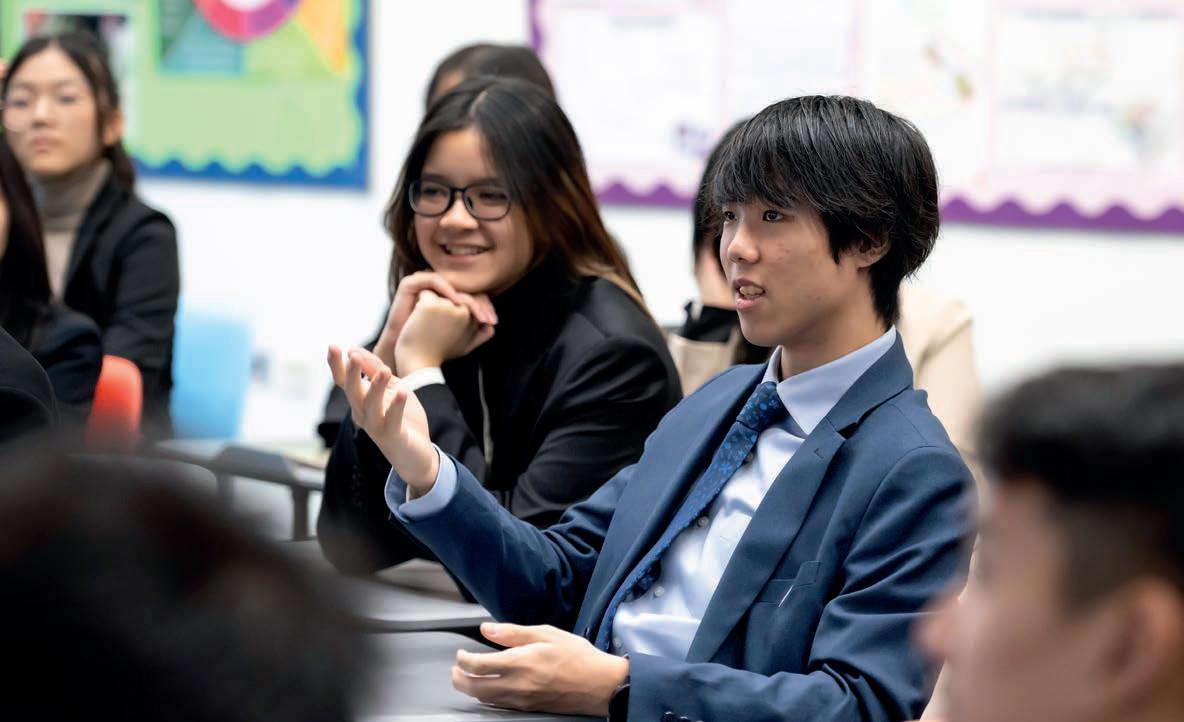
A-level music fosters practical, creative and intellectual growth. The physical coordination required to play an instrument or sing parallels the demands of athletics, while the inventive integration of ideas, stories and impressions aligns with drama, dance, and the visual arts. Like mathematicians, pupils of music use deductive logic to solve complex problems, yet, akin to literary critics, historians and scientists, they draw on keen observation and apply evaluative skills to a broad range of cultural, social and physical phenomena. Ultimately, music stands apart as a unique way of understanding and interpreting the world.
Building on the skills developed at GCSE, pupils continue exploring three core areas: performing, composing and listening. They refine their listening and appraisal skills, enabling them to make insightful, critical judgments about the music they study. The AS and A-level courses offer a valuable opportunity for those who sing or play an instrument to strengthen their performance skills. Through first hand experience, they learn how music evolves—from its initial concepts to the finished piece— and analyse a wide variety of styles, genres, historical periods and cultural contexts.
We follow the Cambridge International syllabus, beginning in Year 12 with the AS course, which focuses on two key areas: a Listening Paper (Paper 1) and a Practical Music component (Component 2). Pupils learn to analyse set works, develop attentive listening skills, and build their performance and composition techniques through practical exercises. In Year 13, pupils progress to more advanced and specialised coursework, choosing two options from extended performance, extended composition, and investigating music. These choices allow them to refine their technical abilities, foster creativity, and deepen their understanding of music through research-based projects and explorations of diverse repertoire.
Paper 1 (Listening) is the only formal written examination, taken at the end of Year 12. It tests pupils’ ability to engage critically with set works and related repertoire, demonstrating both analytical and listening skills. The practical music component (Component 2) is assessed through internally marked coursework, which is externally moderated and includes both a live performance (6–10 minutes) and two short compositions. In Year 13, there are no formal examinations; instead, pupils submit coursework for two advanced components—Extended Performance (15–20 minute recital and a research report), extended composition (6–8 minute composition and a report), or investigating music (an extended essay and reflective statement). All submitted work is externally assessed by Cambridge.
Requirements
At least a B in IGCSE Music, and at least a grade 6 standard in an instrument or vocally.
Brighton College Bangkok Vibhavadi offers extensive musical opportunities beyond the classroom, encouraging pupils who choose music at AS and A-level to take individual lessons and participate in ensembles such as orchestra, Thai music, fusion band, jazz band, or choir. They are also urged to take leading roles in House music competitions, enhancing their ensemble skills, leadership, and creative collaboration. By studying A-level Music, pupils gain a strong foundation for a variety of musicrelated careers, including classical performance (spanning early music to contemporary), pop, jazz, composing for film or theatre, and music technology. Conductor, teacher,
music producer, sound engineer, DJ, music therapist and music journalist are additional possibilities, and a grounding in technology further opens doors in the recording industry, radio and television. Not all A-level music pupils enter the music industry, but the discipline, teamwork, and problem-solving they develop can be pivotal in finance, law, business and entrepreneurship.
Many leaders in fields such as banking, investments, IT, real estate, fashion and fitness attribute their success to the analytical thinking and collaborative skills honed through their musical training.

Physics is often regarded as the most fundamental of the natural sciences with its far reaching principles. For centuries physicists have gradually unlocked the mechanisms of our infinitely complex universe, building the foundations on which modern society is built. The study of physics at A-level will ultimately allow pupils to admire and begin to comprehend the complexities of nature and her awe-inspiring beauty.
Such appreciation requires far more than the superficial topic-based study adopted at IGCSE. Success at A-level requires an in-depth understanding of many fundamental concepts, and this can only be achieved through a rigorous academic approach.
In Year 12, pupils study the following at AS-level physics: general physics: physical quantities; mechanics: equations of motion; Newton’s Laws; work and energy; linear momentum; electricity: electronic sensors; current electricity; DC circuits andmatter: They also study Young modulus deformation of solids; waves: wave theory; superposition; interference; polorisation and diffraction; nuclear physics: the nucleus; isotopes and ionising radiation fundamental particles.
Pupils study the following in Year 13 physics : circular motion & gravitation: motion in a circle; gravitational fields; electric fields and capacitors: Coulomb’s law; electric potential; capacitance; simple harmonic motion: oscillations; damping; resonance; thermodynamics: ideal gases; temperature; thermal properties of materials; magnetic
effects and AC: magnetic fields, electromagnetic induction; alternating currents; modern physics: charged particles; quantum physics; e = mc2; radioactive decay; nuclear energy; astronomy and cosmology; medical physics; CAT scans; ultrasound and xrays.
In Year 12 AS-level Physics pupils are assessed by three papers.
Paper 1: A 40 question multiple choice paper lasting 1 hour. Paper 2: A 60 mark structured question paper requiring written responses lasting 1 hour 15 minutes.
Paper 3: A 40 mark advanced practical paper which lasts for 2 hours and takes place in the school laboratory.
In Year 13 A-level Physics pupils are assessed by two papers:
Paper 4: A 100 mark structured question paper lasting 2 hours. Knowledge of material from the AS-level syllabus content will be required.
Paper 5: A 30 mark planning exercise.
Apart from its importance as a subject to be studied in its own right (there are numerous openings for physics graduates in very many areas of research, both academic and industrial), physics at A-level is a necessary qualification for many scientific and engineering courses in higher education.
Course Requirements
At least a B in IGCSE Physics and IGCSE Mathematics.
Psychology is a science: the traditional definition is ‘the scientific study of mind and behaviour’. In other words, it covers a vast expanse of knowledge and a wide range of phenomena ranging from the activity of a single nerve cell to our social interactions in a complex socio-cultural environment. Its roots lie in the fundamental questions of philosophy, but the development of psychology as a discrete discipline has brought with it an increasing emphasis on scientific method and empirical research.
Despite all these developments, people often view psychology as mere common sense. However, whilst our first instincts in interpreting behaviour are often useful, one often finds that when tested out these theories are not valid interpretations of our world. Psychology is challenging both academically and personally, and involves an individual journey which will broaden pupils outlooks, challenge assumptions, make them think, increase self-awareness, introduce contemporary topics and issues, develop transferable skills, link theory and practice, and complement other studies.
In Year 12 the AS-level is divided into two sections. The first is titled ‘Approaches, Issues and Debates.’ Psychological approaches are perspectives that involve certain beliefs about human behaviour and how individual differences can be explained. Pupils will study a wide range of approaches: social, learning, cognitive and biological. This will allow them to develop an ability to analyse and evaluate information from various perspectives. The issues and debates considered at AS-level are: the application of psychology to everyday life; individual and situational explanations of behaviour; the use of animals and children in psychological research and the nature versus nurture debate. The second is titled ‘Research methods’, in which pupils will learn methods of investigating human behaviour; how to design and conduct their own investigations and analyse data collected.
The second year of the psychology A-level focuses on the relevance of psychology in contemporary society. Pupils will have the opportunity to study two topics: clinical psychology and consumer psychology. Psychology underpins many aspects of our lives – it is used to understand our own selves better, diagnose and treat medical conditions and to improve how we learn. Every study is undertaken with a specific purpose in mind, and pupils will learn how to apply such studies to everyday life.
The course is 100% written examination. There will be two 1.5 hour exam papers to be completed at the end of each Sixth Formyear. Each will contain a combination of shortanswer questions and essay or planning questions. Exam technique and practice will be a key focus in both homework and lessons, in order to ensure pupils are developing their essay writing skills and making the requisite progress.
Many pupils who study psychology at A-level go on to complete a BPS accredited degree course in the subject. From this they can progress to careers as professional psychologists (clinical, educational, occupational, sports, research, forensic) or to qualify as a lawyer, move into management or any of a variety of careers that make use of their ability to communicate, to analyse data and to understand people.
Course Requirements
At least a C in IGCSE Mathematics and IGCSE English.
The A-Level Physical Education (PE) programme at Brighton College Bangkok Vibhavadi follows the Edexcel curriculum, a dynamic and rigorous course designed for pupils who are passionate about sports, fitness, and understanding the science behind physical activity. This programme offers an in-depth exploration of both theoretical and practical components, preparing pupils for further education and careers in sports science, physiotherapy, coaching, and related fields.
Course Overview
Theoretical Knowledge: Pupils will study key topics such as anatomy and physiology, biomechanics, psychology of sport, and the socio-cultural influences on physical activity and sport.
Practical Application: Pupils will develop advanced skills in their chosen sport(s) and learn to analyse and evaluate their own and others’ performance.
Coursework: Includes a performance or coaching assessment in a chosen activity and a written evaluation of performance improvement.
Examinations: Focus on applying theoretical knowledge to practical scenarios, ensuring a well-rounded understanding of the subject.
Component 1: Scientific Principles of Physical Education: this will consist of a 2.5 hour written examination worth 40% of the total qualification.
Component 2: Psychological and Social Principles of Physical Education: this will consist of a 2 hour written examination worth 30% of the total qualification.
Component 3: Practical Performance and Performance Analysis: this will consist of a non-examined assessment (NEA) worth 30% of the total qualification.
Completing the A-level PE programme equips pupils with transferable skills such as critical thinking, teamwork, and leadership. Graduates often pursue university courses and careers in fields such as sports science, physiotherapy, coaching, teaching, and sports psychology.
By offering a balance of academic rigour and practical engagement, this programme fosters a deep appreciation of physical education while setting pupils up for success in both higher education and professional pursuits.
Course Requirements
At least an A in IGCSE PE, and a strong interest in at least one sport.
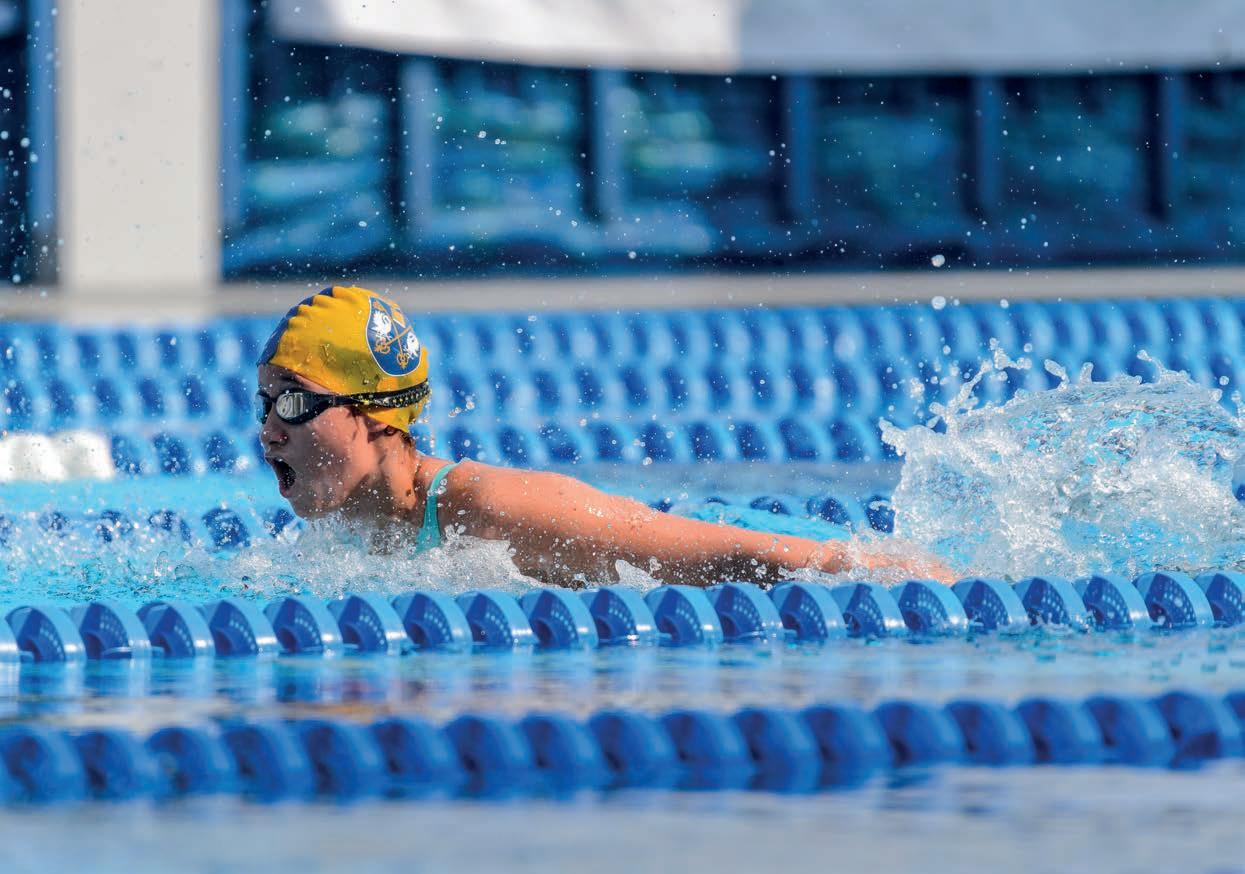
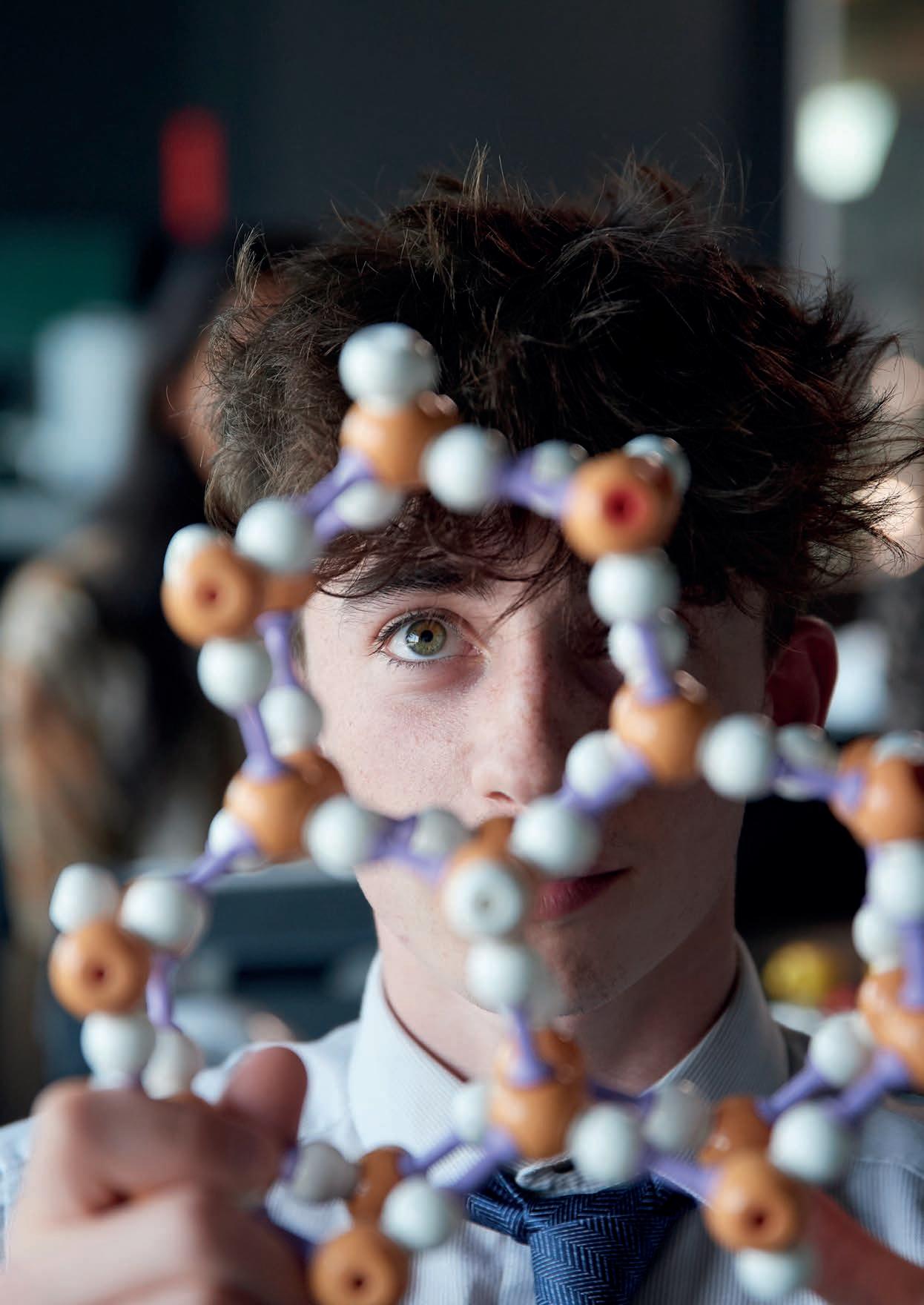
Subject Name Exam Board Subject Lead
Art: Fine Art Cambridge
Biology Cambridge
Business Studies Cambridge
Chemistry Cambridge
Chinese Cambridge
Computer Science Cambridge
Design and Technology TBC
English Literature Cambridge
Geography Cambridge
History Cambridge
Information Technology Cambridge
Maths/ Further Maths Edexcel
Music Cambridge
Physics Cambridge
Psychology Cambridge
Physical Education Edexcel
Ms Kiriaki Hajiloizis
Mr Chris Brown
Mr Luke Turnill
Mr Selwyn Lespoir
Ms Cao Jing
Mr Chris Windeatt
Mr Neil Hayward
Mr Joseph Broadfoot
Mr Tim Abraham
Mr Neil Walkden
Mr Chris Windeatt
Mr Scott Caffery
Mr Simon Hunt
Mr Lawrence Kelly
Ms Emily Bilsby
Mr Charles Vernon
